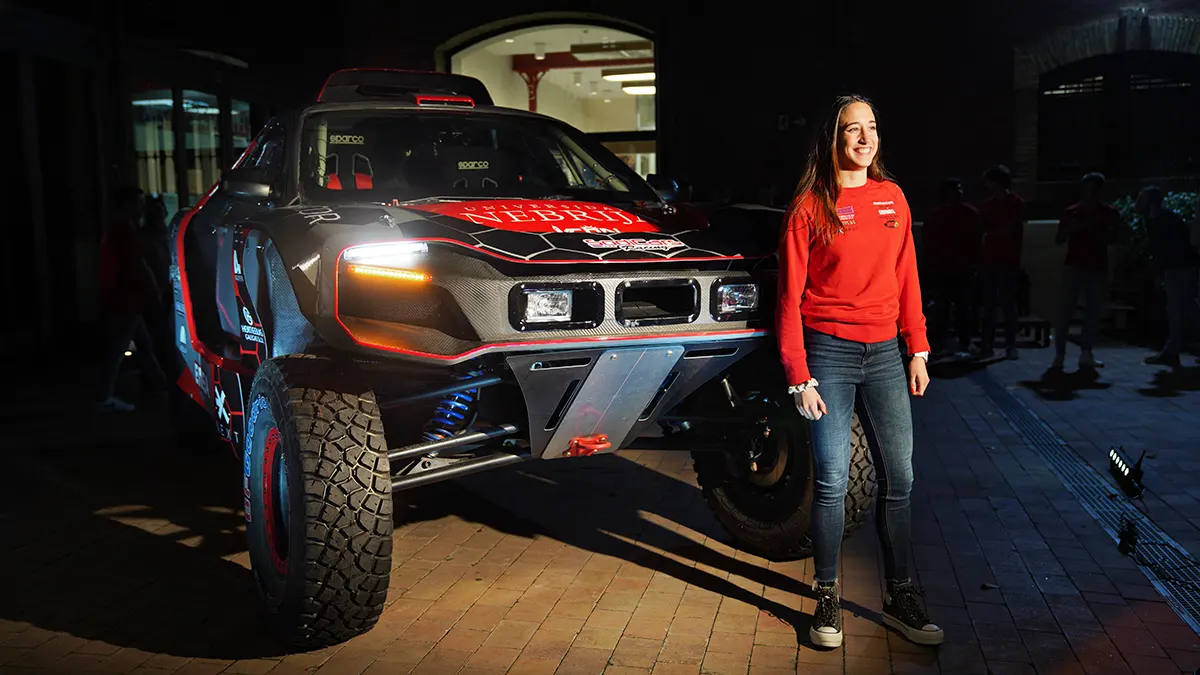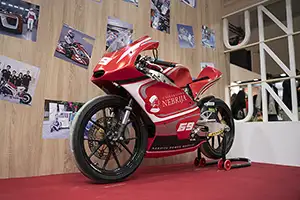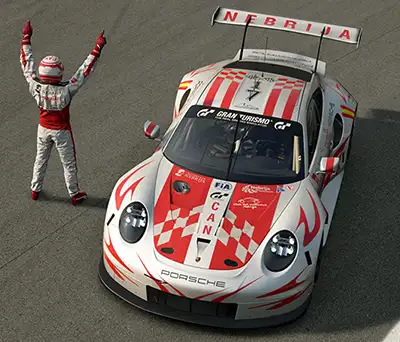Degree in Automobile Engineering
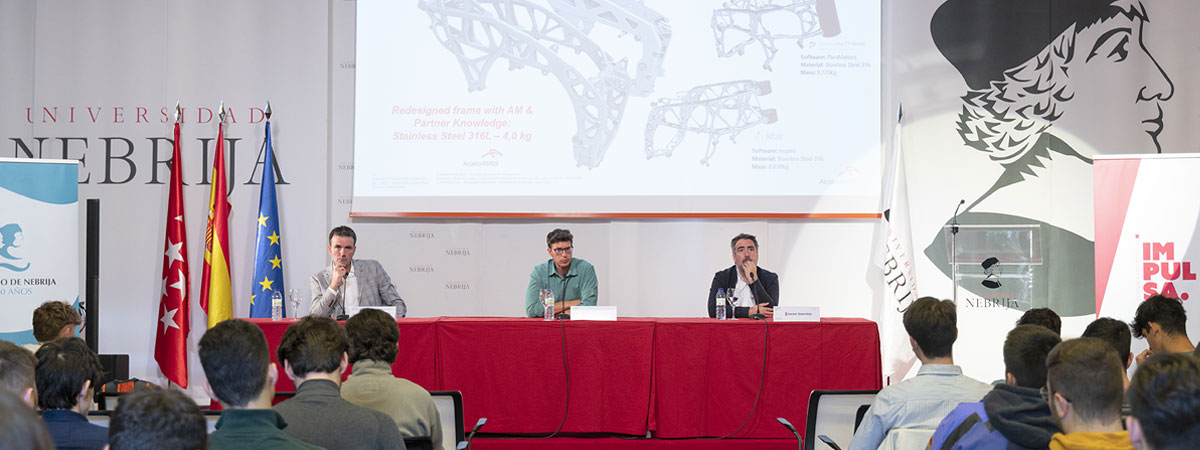
The automotive industry accounts for 10% of Spain’s GDP
The Bachelor’s Degree in Automobile Engineering is very closely related to the degree in Mechanical Engineering, but focussed more specifically on the car industry. However, the sector encompasses a range of sub-sectors and areas of activity that are sufficiently broad to justify a specific degree programme.
Graduates will obtain a very robust scientific foundation coupled with accurate analytical skills to solve multidisciplinary problems, while equipping them with decision-making ability and enhancing creativity and critical reasoning in the domain of automobile engineering.
Graduate engineers will have leadership and project management skills. They must also be able to handle specifications, regulations and mandatory laws and standards in the automobile industry, and analyse and assess the social and environmental impact of proposed solutions.
Graduates must organise and plan company structures. They are also provided with the scientific/technological fundamentals required for independent learning or for going on to postgraduate study to enable them to deepen their knowledge and/or specialise in various fields of engineering, particularly for admission to postgraduate study on automobiles and industrial activity.
Automobile Engineering graduates can also access the master's programme in Industrial Engineering, which involves admission to the professional body. [+info]
Nebrija To Dakar – “Discover the Nebrija To Dakar project, where you can actively participate while you study the Degree”
Automobile Club
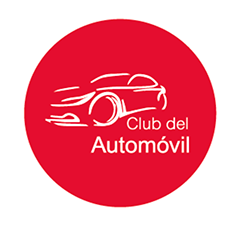
The Automobile Club provides students with diverse opportunities connected to various vehicular aspects. Beyond fostering a community among members, these initiatives aim to deepen their understanding of subjects relevant to their future endeavors in the automotive field.
- Courses: competition marshals, introduction to track engineering, robotics, office automation, introduction to Aerodynamics and CFD.
- Activities: team karting, visits to fairs, circuits, rallies, conferences and master classes.
- Projects: Nebrija Carcross, Nebrija To Dakar, Nebrija Power Wheelie, Nebrija Virtual Engineering and Nebrija & Escudería Centro.
Student profile:Aimed at young people who are passionate about the automotive world, and want to make it their profession.
Undergraduate profile:
- Desde una sólida base de formación científica y tecnológica, sea capaz de liderar los procesos de innovación en las empresas del sector del automóvil, trabajando en un entorno internacional y multidisciplinar.
- Con una amplia capacidad de análisis para le resolución de problemas en entornos multidisciplinares y multilingüe con iniciativa, toma de decisión, creatividad y razonamiento crítico.
- Asumir tareas de liderazgo, organización, planificación y dirección dentro de las actividades de la empresa en general y en particular dentro de las del sector del automóvil.
- Manejar especificaciones, reglamentos y normativa de obligado cumplimiento, tanto interna propia de las empresas del sector del automóvil como de legislación general aplicable al sector.
- Aplicar los principios y métodos de calidad.
- Analizar y valorar el impacto social y medioambiental de las soluciones técnicas propuestas.
- Aprender autónomamente y cursar estudios de postgrado que le permitan profundizar y/o especializarse en los diferentes campos de la ingeniería.
Official qualification:Bachelor's degree in Automobile Engineering
Host faculty:Higher Polytechnic School
Branch of knowledge:Engineering and Architecture
Available places: 55
Total Credits 240 ECTS credits.
Minimum 12 ECTS and maximum 90 ECTS per registration and academic period.
CYear of degree course foundation:2010
Language:This degree course is taught in Spanish
Type of Education: Classroom attendance
Academic Regulations: General student’s regulations. Credit transfer and recognition. Regulation of student participation. Common procedures for carrying out the Final Research Project
University Services: [+info]
Internal Quality Assurance System System managers Incidents, Suggestions and Complaints Job placement report and assessment of training received
The only fully implemented degree course in Spain dedicated to automobile engineering
Curriculum
BOE No.294, of 6 decembre, 2016.
All our degrees and curricula have been prepared in accordance with the new guidelines set by current legislation, having already been verified by the National Agency for Quality Assessment.
The student must complete 240 credits
First year 60 ECTS
First Semester 30 ECTS- 6 ECTS | Calculus I
- 6 ECTS | Physics I
- 6 ECTS | Graphical Expression I
- 6 ECTS | Fundamentals of Computing
- 6 ECTS | Leadership I
Second Semester 30 ECTS- 6 ECTS | Mathematics I
- 6 ECTS | Vehicle Systems and Parts I
- 6 ECTS | Physics II
- 6 ECTS | Graphical Expression II
- 6 ECTS | Chemistry
Second year 60 ECTS
First Semester 30 ECTS- 6 ECTS | Calculus II
- 6 ECTS | Graphical Engineering in the Automobile I
- 6 ECTS | Circuits
- 6 ECTS | Fundamentals of the Science of Materials
- 6 ECTS | Regulations
Second Semester 30 ECTS- 6 ECTS | Mathematics II
- 6 ECTS | Graphical Engineering in the Automobile II
- 6 ECTS | Materials in the Automobile Environment
- 6 ECTS | Thermodynamics
- 6 ECTS | Electronics
Third year 48 ECTS
First Semester 24 ECTS- 6 ECTS | Statistics
- 6 ECTS | Theory of Machines
- 6 ECTS | Resistance of Materials
- 6 ECTS | Fluid Mechanics
Second Semester 24 ECTS- 6 ECTS | Automation and Control Methods
- 6 ECTS | Motors
- 6 ECTS | Electric Machines
- 6 ECTS | Theory of Vehicles
- 6 ECTS | Development of Interpersonal Involvement and Solidarity
Fourth year 72 ECTS
First Semester 36 ECTS- 6 ECTS | Electric Vehicles
- 6 ECTS | Industrial Processes I
- 6 ECTS | Calculation of Structures
- 6 ECTS | Automobile Instrumentation and Electronics
- 12 ECTS | Assessment of Business Skills Development
Second Semester 36 ECTS- 6 ECTS | Industrial Processes II
- 6 ECTS | Automobile Quality and Project Management
- 6 ECTS | Vehicle Systems and Parts II
- 6 ECTS | Leadership II
- 12 ECTS | Final Research Project
More info about the subjects
Consisting of Communication and Emotional Intelligence, Teamwork, Project Management, Leadership and Negotiation, Skills Development Workshops (includes English level test)
- 6 ECTS | Communication, Emotional Intelligence and Teamwork Workshops
- 6 ECTS | Project Management, Leadership and Negotiation Workshops
- 6 ECTS | Lidera I and II Professional Skills Development Workshops
The recognition of 6 credits will be assessed depending on the different activities that the student performs throughout his degree. They will be awarded for university cultural activities, sports, student representation, solidarity and cooperation, or for taking one of the following subjects: Ethics of volunteering or Human Rights.
Program which aims to promote the practical training of students, under the continuous supervision of the Department of Professional Careers of the University, the academic department corresponding to the degree and the company or collaborating institution where the practices are carried out. Advice is provided on the internship and there is follow-up and tutoring, always taking into account the professional orientation of each student.
List of companies and institutions where the students of the degree have had internships under the agreement of educational cooperation. More information on Company InternshipsThe End of Degree Project is an academic report that delves into a subject of the curriculum and allows the evaluation of the skills acquired in the Degree. It can be linked to the professional internship or it can also be part of a research project.
Through the transversal subjects you will be able to complement your education and complete your CV in a practical, collaborative and fun way.
It is a voluntary program with no added cost. Upon completion, you will be provided with a diploma.
Access all the informationNebrija University, which is committed to languages and quality, provides the student with added value with the Diploma in English Professional Communication, which will allow him/her to achieve with confidence the competence demanded to successfully join the labor market.
It corresponds to level C1.
More information herePrevious curriculum (to extinguish)
Third year 48 ECTS
First Semester 30 ECTS- 6 ECTS | Statistics
- 6 ECTS | Electronics
- 6 ECTS | Theory of Machines
- 6 ECTS | Resistance of Materials
- 6 ECTS | Fluid Mechanics
Second Semester 24 ECTS- 6 ECTS | Automatismos y Métodos de Control
- 6 ECTS | Motors
- 6 ECTS | Electric Machines
- 6 ECTS | Teoría de Vehículos
- 6 ECTS | Development of the Participative and Solidarity Spirit
Fourth year 78 ECTS
First Semester 30 ECTS- 6 ECTS | Reglamentación
- 6 ECTS | Electric Vehicles
- 6 ECTS | Procesos Industriales I
- 6 ECTS | Cálculo de Estructuras
- 6 ECTS | Instrumentación y Electrónica del Automóvil
Second Semester 48 ECTS- 6 ECTS | Procesos Industriales II
- 6 ECTS | Calidad y Gestión de Proyectos de Automoción
- 6 ECTS | Vehicle Systems and Parts II
- 6 ECTS | Leadership II
- 12 ECTS | Assessment of Business Skills Development
- 12 ECTS | Final Research Project
Access to the Master's Degree in Industrial Engineering
Acceso al Máster
Los graduados en Automobile Engineering tienen acceso al Máster Universitario en Ingeniería Industrial, posibilitando el acceso al colegio profesional, aunque deberán cursar, de no haberlo hecho antes, los 39 ECTS complementarios que se muestran en esta tabla.
| SUBJECTS | CREDITS |
| La empresa y su entorno | 6 |
| Medio ambiente y sostenibilidad | 6 |
| Dirección y organización de empresas | 3 |
| Proyectos | 6 |
| Ingeniería química | 6 |
| Ingeniería térmica | 6 |
| Sistemas digitales | 6 |
| TOTAL | 39 |
Professors
| Profesores Professors | Porcentaje de Doctores Percentage of PhD holders |
| 60 | 59% |
Profesores
Professors
 Daniel Gómez Lendínez
Director del Grado en Ingeniería del Automóvil
Daniel Gómez Lendínez
Director del Grado en Ingeniería del AutomóvilCoordinador de Trabajos Fin de Grado Director of the Bachelor's Degree in Automobile Engineering
Final Degree Project Coordinator Doctor en Mecánica de fluidos por la Universidad Carlos III de Madrid. Graduado en Ingeniería Mecánica bilingüe y Máster en Mecánica industrial por la Universidad Carlos III de Madrid. Experiencia de cuatro años en cálculo estructural, fluido y térmico en sector de la automoción y nuclear en Innomerics como ingeniero y responsable de proyecto. Co-fundador y co-responsable del equipo de Formula Student de la Universidad Carlos III de Madrid durante 7 años. Profesor de Mecánica de fluidos, simulación numérica e instalaciones hidráulicas durante cinco años en la Universidad Carlos III de Madrid. Profesor de aerodinámica durante dos años en la Universidad Francisco de Vitoria. Profesor de la Universidad Nebrija desde 2022. Su tesis versó sobre estabilidad de chorros de baja densidad y llamas de difusión.
 Roberto Álvarez Fernández
Director del Departamento Escuela de Ingeniería Industrial
Roberto Álvarez Fernández
Director del Departamento Escuela de Ingeniería IndustrialDirector de Trabajos Fin de Grado Director of the School of Industrial Engineering Department
Director of Final Degree Projects Doctor en Ingeniería Industrial especialidad en Ingeniería de los procesos de fabricación. Ingeniero Industrial especialidad en electrotecnia y especialidad en organización de la producción. Profesor acreditado en las figuras de contratado doctor y profesor de universidad privada. 22 años de experiencia docente y 14 años de experiencia investigadora. Cuenta con dos sexenios de investigación, más de 1400 citas en Google Scholar Citations, 24 artículos en revistas indexadas en el JCR (Journal Citations Reports) de los cuales 15 corresponden al primer cuartil (Q1). Ha publicado dos libros con la editorial Springer y numerosos capítulos de libros, participaciones en congresos y charlas, tanto nacionales como internacionales. Su línea de investigación se centra en la sostenibilidad en el uso de las infraestructuras urbanas y el consumo de energía, incluyendo la actividad industrial, la movilidad y la cuantificación de las emisiones de gases de efecto invernadero debida a dichas actividades.
 Adrián Altamira Peña
Profesor del área de Expresión Gráfica
Professor of the area of Graphic Expression
Graduado en Ingeniería Mecánica e Ingeniería en Diseño Industrial y Desarrollo de Productos por la Universitat Politècnica de València. Experiencia docente como profesor de refuerzo en asignaturas desde la ESO hasta cursos universitarios.
Adrián Altamira Peña
Profesor del área de Expresión Gráfica
Professor of the area of Graphic Expression
Graduado en Ingeniería Mecánica e Ingeniería en Diseño Industrial y Desarrollo de Productos por la Universitat Politècnica de València. Experiencia docente como profesor de refuerzo en asignaturas desde la ESO hasta cursos universitarios.
 Juan Carlos Arroyo Portero
Director de la Escuela Politécnica Superior.
Juan Carlos Arroyo Portero
Director de la Escuela Politécnica Superior.Profesor del área de Estructuras Director of the Higher Polytechnic School.
Professor of the area of Structures Ingeniero de caminos, canales y puertos (UPM, 1990). Doctor en arquitectura (UCJC, 2017). Fundador de CALTER ingeniería (1997), CINTER divulgación técnica (2000), Ingenio.xyz (2005).
Comienza a investigar en la ETSICCP de la UPM (1990) sobre juntas de dilatación, lo que le llevó a proyectar el récord del mundo de estructura sin juntas (1998, Aldaia). Ha publicado numerosos artículos de investigación y realizaciones en las revistas españolas del sector y en los congresos internacionales celebrados en España en los últimos 25 años. Es autor de varias patentes, dos sobre estructuras plegables, una sobre nudos prefabricados en la unión entre dovelas de torres eólicas prefabricadas de hormigón y una patente de construcción modular de edificios 3D. Entre sus publicaciones: prontuario informático del hormigón en 1992, un libro y software gratuito imprescindible de las oficinas españolas de proyecto de estructuras. Números gordos en el proyecto de estructuras en 2001. Coautor de las ediciones 15ª y 16ª de Hormigón armado, Jiménez Montoya.
Profesor desde 1992 en numerosos cursos de postgrado (UNED, Universidad de Sevilla, UPC y UPM). Ha dirigido cursos de verano en la UCJC, y cursos de experto en la Universidad de Catilla la Mancha y el Master de estructuras de edificación de la UNED y la Escuela de la Edificación. Ha sipo profesor asociado en la ETSICCP, EUAT y ETSAM de la UPM.
Como ingeniero estructural, entre sus obras más destacadas se cuentan, entre otras: los aeropuertos de Cali, Reus, Ciudad Real, y la T4 de Barajas (en colaboración); la Biblioteca del Estado en Santiago de Compostela; la comisaría local de la Policía de Plasencia; el Recinto ferial de A Coruña; la rehabilitación de la Fundación Jiménez Díaz; más de cien torres eólicas de hormigón; la remonta de las Torres Colón.
 Miren Aurkene Alzua Sorzabal
Directora de Trabajos Fin de Grado
Director of End of Degree Projects
Doctora en Turismo Internacional en la Universidad de Purdue, Estados Unidos (1999). Su trabajo inicial se concentró en la aplicación de modelos psicosociales en el ámbito del turismo, el patrimonio cultural y natural. Actualmente posee una doble afiliación a la Universidad de Nebrija y Universidad de Deusto. Lidera el Grupo de Investigación en Investigación e Innovación en Turismo Inteligente de la Universidad Nebrija. Es co-fundadora de la empresa Lurmetrika Labs dedicada a la inteligencia turística y analítica avanzada en turismo. Tene una amplia experiencia en la investigación y el campo académico del turismo. Ha sido Directora Ejecutiva del Centro de Investigación de Competencias de Investigación en Turismo, CICtourGUNE. Ha estado a cargo de cursos y seminarios en la Universidad Purdue, en la Universidad Rovira I Virgilli y en la Universidad Deusto. Ha coordinado varios programas académicos como el "Master of Arts in Euroculture" (Erasmus Mundus) y ha participado en varias redes europeas de excelencia. Ha dirigido importantes proyectos de investigación competitivos y ha colaborado con las administraciones públicas vasca, española e internacional. El alcance de la investigación de la Dra. Alzua-Sorzabal se centra en Turismo, Destinos Turísticos Inteligentes, Sistemas Avanzados de Medición y Análisis (Bid Data), e innovación. Sus últimos trabajos se centran en estrategias competitivas para destinos turísticos inteligentes e identificación de nuevas métricas para modelar y poner en acción la inteligencia en el sector turístico. Es miembro del consejo editorial de Information Technology & Tourism. Sus trabajos están publicados en diversas revistas de impacto.
Miren Aurkene Alzua Sorzabal
Directora de Trabajos Fin de Grado
Director of End of Degree Projects
Doctora en Turismo Internacional en la Universidad de Purdue, Estados Unidos (1999). Su trabajo inicial se concentró en la aplicación de modelos psicosociales en el ámbito del turismo, el patrimonio cultural y natural. Actualmente posee una doble afiliación a la Universidad de Nebrija y Universidad de Deusto. Lidera el Grupo de Investigación en Investigación e Innovación en Turismo Inteligente de la Universidad Nebrija. Es co-fundadora de la empresa Lurmetrika Labs dedicada a la inteligencia turística y analítica avanzada en turismo. Tene una amplia experiencia en la investigación y el campo académico del turismo. Ha sido Directora Ejecutiva del Centro de Investigación de Competencias de Investigación en Turismo, CICtourGUNE. Ha estado a cargo de cursos y seminarios en la Universidad Purdue, en la Universidad Rovira I Virgilli y en la Universidad Deusto. Ha coordinado varios programas académicos como el "Master of Arts in Euroculture" (Erasmus Mundus) y ha participado en varias redes europeas de excelencia. Ha dirigido importantes proyectos de investigación competitivos y ha colaborado con las administraciones públicas vasca, española e internacional. El alcance de la investigación de la Dra. Alzua-Sorzabal se centra en Turismo, Destinos Turísticos Inteligentes, Sistemas Avanzados de Medición y Análisis (Bid Data), e innovación. Sus últimos trabajos se centran en estrategias competitivas para destinos turísticos inteligentes e identificación de nuevas métricas para modelar y poner en acción la inteligencia en el sector turístico. Es miembro del consejo editorial de Information Technology & Tourism. Sus trabajos están publicados en diversas revistas de impacto.
 Alberto Avecilla García
Profesor del área de Materiales
Professor of the Materials area
Ingeniero industrial. Executive MBA por el IE Business School y profesor, con 20 años de experiencia en diferentes sectores. En consultoría digital, es experto en la puesta en marcha e implementación de proyectos en las áreas de innovación y transformación digital: gemelo digital, plataforma digital para el seguimiento y análisis de proyectos y activos, análisis predictivo, sensorización y geolocalización de maquinaria en lugares complejos como túneles y un proyecto medioambiental (ESG) para darle una segunda vida a los materiales. En los sectores de industria, construcción y logística (en empresas como Albatros, FCC, OSSA y Sacyr) ha desarrollado proyectos de gestión de activos de vehículos y maquinaria con multitud de países, siendo responsable de toda la cadena de valor (compra, mantenimiento y maximización de la vida útil, logística y desinversión).
Alberto Avecilla García
Profesor del área de Materiales
Professor of the Materials area
Ingeniero industrial. Executive MBA por el IE Business School y profesor, con 20 años de experiencia en diferentes sectores. En consultoría digital, es experto en la puesta en marcha e implementación de proyectos en las áreas de innovación y transformación digital: gemelo digital, plataforma digital para el seguimiento y análisis de proyectos y activos, análisis predictivo, sensorización y geolocalización de maquinaria en lugares complejos como túneles y un proyecto medioambiental (ESG) para darle una segunda vida a los materiales. En los sectores de industria, construcción y logística (en empresas como Albatros, FCC, OSSA y Sacyr) ha desarrollado proyectos de gestión de activos de vehículos y maquinaria con multitud de países, siendo responsable de toda la cadena de valor (compra, mantenimiento y maximización de la vida útil, logística y desinversión).
 Joseba K. Azcaray Fernández
Director del Máster en Diseño Industrial y del Grado en Ingeniería en Diseño Industrial y Desarrollo del Producto
Joseba K. Azcaray Fernández
Director del Máster en Diseño Industrial y del Grado en Ingeniería en Diseño Industrial y Desarrollo del ProductoDirector de Trabajos Fin de Grado Director of the Master's Degree in Industrial Design and the Degree in Engineering in Industrial Design and Product Development
Director of End of Degree Projects Doctor Internacional con mención Cum Laude en diseño, fabricación y gestión de proyectos industriales por la Universitat Politècnica de València (UPV). Actualmente es director del grado en ingeniería en Diseño Industrial y Desarrollo de Producto y máster de la Universidad de Nebrija especializado en el área de innovación e investigación de proyectos.
Ha colaborado en proyectos internacionales en el que destaca la estancia en la universidad de LABA (Italia) con el proyecto de investigación de las nuevas tecnologías creativas aplicadas a la docencia.
Funda en Bilbao el estudio W! design con el proyecto Txikitech, donde desarrollan e investigan la inclusión de metodologías basadas en el diseño en el sistema curricular de la enseñanza a través de las nuevas tecnologías. En él se alcanza el conocimiento de las ciencias, matemáticas, ingeniería, tecnología y el arte (STEAM) desde metodologías del diseño. En la actualidad, la escuela posee entorno 1000 alumnos y expandido en varios puntos. A su vez, dirige un equipo de investigación y desarrollo de producto relacionado con las nuevas tecnologías opensources y fabricación digital.
 Francisco Badea Romero
Profesor del área de Ingeniería Mecánica
Francisco Badea Romero
Profesor del área de Ingeniería MecánicaIP del grupo de investigación Nebrija en Ingeniería de Vehículos (GREEN) Professor of the Mechanical Engineering area
IP of the Nebrija research group in Vehicle Engineering (GREEN) Doctor en Ingeniería Mecánica por la Universidad Politécnica de Madrid. Ingeniero de Automóviles por la Universidad Politécnica de Bucarest (2002-2007). Ha realizado dos Máster, uno en Ingeniería Mecánica (Universidad Politécnica de Madrid) y otro en Ingeniería de Automóviles (Universidad de Bucarest). Doctorado en Ingeniería Mecánica (2014) en la Universidad Politécnica de Madrid. Ha sido profesor del Máster en Automoción INSIA-UPM (Vibraciones, análisis modales, harmónicos y transitorios mediante elementos finitos) entre 2010/2015. Profesor universitario acreditado a la figura profesor ayudante doctor por la ANECA.
Su experiencia en investigación ha estado relacionada con el Instituto universitario de investigación del automóvil (Madrid) - 03/2009-12/2014 y con el Georgia Institute of Technology (Atlanta) – 05/2011-09/2011. Actualmente con el Grupo Nebrija de Ingeniería de Vehículos GREEN.
Más de ocho años de experiencia docente en la Universidad Nebrija en asignaturas relacionadas con teoría de máquinas, cálculo y diseño avanzado de máquinas e ingeniería por ordenador.
 Rafael Barea del Cerro
Coordinador del Programa de Doctorado en Tecnologías Industriales e Informáticas
Rafael Barea del Cerro
Coordinador del Programa de Doctorado en Tecnologías Industriales e Informáticas Profesor del área de Materiales Coordinator of the Doctoral Program in Industrial and Computer Technologies
Professor of the Materials area Doctor por la UAM, Ingeniero de Materiales por la UPM, Licenciado en CC Físicas y Diplomado en Magisterio por la UCM. Especialista universitario en elementos finitos en problemas térmicos por la UNED. Experiencia investigadora durante más de 20 años en diferentes centros del CSIC y en la Universidad Nebrija. Profesor titular por la ANECA, posee tres sexenios de investigación. Especialidades: procesamiento y caracterización de materiales cerámicos y metálicos, en modelos matemáticos y simulación (redes neuronales, lógica difusa, inteligencia artificial, elementos finitos, modelización de propiedades no lineales de materiales...). Actualmente trabajando en el área de fabricación aditiva en inoxidables, en propiedades mecánicas de aleaciones de magnesio y electromagnéticas de perovskitas con orientación a la fabricación de piezas y sensores de la industria del transporte (aviones, trenes, barcos y automóviles).
 Fernando Beltrán Cilleruelo
Profesor del área de Expresión Gráfica
Professor of the area of Graphic Expression
Ingeniero Técnico Industrial por la Escuela Universitaria de Ingeniería Técnica Industrial de Bilbao, (UPV) y Graduado en Ingeniería Mecánica por la Escuela Politécnica Superior de la Universidad Nebrija. Mas de 10 años de experiencia como Project Manager en el campo de la construcción industrial y residencial.
Instructor del módulo MATLAB-Simulink y Catia V5 para el grado de Ingeniería para el Motociclismo de Competición, organizado por la Fundación General de la Universidad Politécnica de Madrid (FGUPM), impartido en la Escuela Técnica Superior de Ingeniería y Diseño Industrial de la UPM (ETSIDI-UPM).
Actualmente, profesor asociado en la Escuela Politécnica Superior de la Universidad Nebrija desde 2017, en las áreas de Expresión gráfica e Ingeniería Eléctrica. Colaboraciones en el área de movilidad sostenible y huella de carbono.
Publicaciones en el área de la movilidad: “A new approach to battery powered electric vehicles: A hydrogen fuel-cell based range extender system”. International Journal of Hydrogen Energy; “Fuel optimization strategy for hydrogen fuel cell range extender vehicles applying genetic algorithms” Renewable and Sustainable Energy Reviews. ELSEVIER. - Otras publicaciones: "Carbon footprint calculator for urban planning in the Community of Madrid", considerada como una de las mejores SUSTAINABILITY ACTIONS 2022 de impacto ambiental y social, en su II Edición. “Measuring to evaluate alternatives: the carbon footprint calculator for urban planning of the Community of Madrid” International Journal Proceedings of Science and Technology, y How does the urban growth in climate change? Ciudad Sostenible 2023.
Accesit en los premios a los trabajos Fin de Grado correspondientes al curso 2014-2015, con el proyecto “Análisis de la influencia de la conducción en la eficiencia e impacto ambiental de un vehículo eléctrico. (MATLAB-SIMULINK)” por el Colegio Oficial de Ingenieros Técnicos Industriales de Madrid.
Fernando Beltrán Cilleruelo
Profesor del área de Expresión Gráfica
Professor of the area of Graphic Expression
Ingeniero Técnico Industrial por la Escuela Universitaria de Ingeniería Técnica Industrial de Bilbao, (UPV) y Graduado en Ingeniería Mecánica por la Escuela Politécnica Superior de la Universidad Nebrija. Mas de 10 años de experiencia como Project Manager en el campo de la construcción industrial y residencial.
Instructor del módulo MATLAB-Simulink y Catia V5 para el grado de Ingeniería para el Motociclismo de Competición, organizado por la Fundación General de la Universidad Politécnica de Madrid (FGUPM), impartido en la Escuela Técnica Superior de Ingeniería y Diseño Industrial de la UPM (ETSIDI-UPM).
Actualmente, profesor asociado en la Escuela Politécnica Superior de la Universidad Nebrija desde 2017, en las áreas de Expresión gráfica e Ingeniería Eléctrica. Colaboraciones en el área de movilidad sostenible y huella de carbono.
Publicaciones en el área de la movilidad: “A new approach to battery powered electric vehicles: A hydrogen fuel-cell based range extender system”. International Journal of Hydrogen Energy; “Fuel optimization strategy for hydrogen fuel cell range extender vehicles applying genetic algorithms” Renewable and Sustainable Energy Reviews. ELSEVIER. - Otras publicaciones: "Carbon footprint calculator for urban planning in the Community of Madrid", considerada como una de las mejores SUSTAINABILITY ACTIONS 2022 de impacto ambiental y social, en su II Edición. “Measuring to evaluate alternatives: the carbon footprint calculator for urban planning of the Community of Madrid” International Journal Proceedings of Science and Technology, y How does the urban growth in climate change? Ciudad Sostenible 2023.
Accesit en los premios a los trabajos Fin de Grado correspondientes al curso 2014-2015, con el proyecto “Análisis de la influencia de la conducción en la eficiencia e impacto ambiental de un vehículo eléctrico. (MATLAB-SIMULINK)” por el Colegio Oficial de Ingenieros Técnicos Industriales de Madrid.
 Ignacio Blanco Soto
Profesor del área de Vehículos
Professor of the Vehicle area
Ingeniero en Organización Industrial por la Universidad Politécnica de Madrid e Ingeniero Técnico Industrial en Electrónica Industrial por la Universidad de Alcalá. Tras un breve paso por IBM como ingeniero de sistemas en la actualidad desarrolla su carrera profesional en el Centro de Experimentación-Certificación de Vehículos y Tecnológico para la Seguridad del Transporte (CESTT) del INTA como Ingeniero de Aprobación Europea. Con un marcado carácter europeísta aporta su experiencia en relaciones internacionales y colabora con el Ministerio de Industria español como representante en diversos grupos de trabajo de la Unión Europea y de la Organización de Naciones Unidas tanto en el ámbito de la interpretación legislativa como en el del desarrollo de nueva normativa. Asimismo, coordina proyectos globales de homologación para los principales fabricantes de vehículos a nivel nacional e internacional.
Ignacio Blanco Soto
Profesor del área de Vehículos
Professor of the Vehicle area
Ingeniero en Organización Industrial por la Universidad Politécnica de Madrid e Ingeniero Técnico Industrial en Electrónica Industrial por la Universidad de Alcalá. Tras un breve paso por IBM como ingeniero de sistemas en la actualidad desarrolla su carrera profesional en el Centro de Experimentación-Certificación de Vehículos y Tecnológico para la Seguridad del Transporte (CESTT) del INTA como Ingeniero de Aprobación Europea. Con un marcado carácter europeísta aporta su experiencia en relaciones internacionales y colabora con el Ministerio de Industria español como representante en diversos grupos de trabajo de la Unión Europea y de la Organización de Naciones Unidas tanto en el ámbito de la interpretación legislativa como en el del desarrollo de nueva normativa. Asimismo, coordina proyectos globales de homologación para los principales fabricantes de vehículos a nivel nacional e internacional.
 Miguel Angel Bravo Hijón
Profesor del área de Fundamentos de la Física y de Expresión Gráfica
Professor in the area of Fundamentals of Physics and Graphic Expression
Ingeniero en Tecnologías Industriales por la UPM, Grado en la Ing. Electrónica y Automática Industrial por la Un. Nebrija., MBA por el IEDE y cursando Máster en Investigación del Diseño Industrial con vistas al futuro doctorado. Actualmente, combina la actividad docente en la universidad con el apoyo de docencia de CATIA en CADTECH (CT Ingenieros) y con ser socio director de ABF Consulting, S.L. Experiencia como Project Manager de edificios emblemáticos para Fondos de Inversión Internacionales y también como gestor de obras y mantenimientos de grandes infraestructuras como EDAR o Centros Comerciales. Por último, destacar los puestos de responsabilidad en Oficina Técnica, Diseño y Calidad en sectores como el Aeronáutico, Construcción y Servicios.
Miguel Angel Bravo Hijón
Profesor del área de Fundamentos de la Física y de Expresión Gráfica
Professor in the area of Fundamentals of Physics and Graphic Expression
Ingeniero en Tecnologías Industriales por la UPM, Grado en la Ing. Electrónica y Automática Industrial por la Un. Nebrija., MBA por el IEDE y cursando Máster en Investigación del Diseño Industrial con vistas al futuro doctorado. Actualmente, combina la actividad docente en la universidad con el apoyo de docencia de CATIA en CADTECH (CT Ingenieros) y con ser socio director de ABF Consulting, S.L. Experiencia como Project Manager de edificios emblemáticos para Fondos de Inversión Internacionales y también como gestor de obras y mantenimientos de grandes infraestructuras como EDAR o Centros Comerciales. Por último, destacar los puestos de responsabilidad en Oficina Técnica, Diseño y Calidad en sectores como el Aeronáutico, Construcción y Servicios.
 Pedro Bueno Carro
Profesor del área de Vehículos
Professor of the Vehicle area
Ingeniero Industrial e Ingeniero Técnico en Electrónica Industrial por la Universidad Antonio de Nebrija. Actualmente desarrolla su carrera profesional en Centro de Experimentación-Certificación de Vehículos y Tecnológico para la Seguridad del Transporte (CESTT) del INTA. Desde el año 2007 trabaja en proyectos de Homologación globales y colabora con el Minetur en grupos internacionales de reglamentación. Ha desarrollado su labor docente en la Universidad Antonio de Nebrija como coordinador de la asignatura de Sistemas de vehículo y componentes desde el año 2009 y como jurado en numerosos PFC. Su labor investigadora la lleva a cabo en la implementación de métodos virtuales en la homologación de vehículos en el proyecto europeo IMVITER.
Pedro Bueno Carro
Profesor del área de Vehículos
Professor of the Vehicle area
Ingeniero Industrial e Ingeniero Técnico en Electrónica Industrial por la Universidad Antonio de Nebrija. Actualmente desarrolla su carrera profesional en Centro de Experimentación-Certificación de Vehículos y Tecnológico para la Seguridad del Transporte (CESTT) del INTA. Desde el año 2007 trabaja en proyectos de Homologación globales y colabora con el Minetur en grupos internacionales de reglamentación. Ha desarrollado su labor docente en la Universidad Antonio de Nebrija como coordinador de la asignatura de Sistemas de vehículo y componentes desde el año 2009 y como jurado en numerosos PFC. Su labor investigadora la lleva a cabo en la implementación de métodos virtuales en la homologación de vehículos en el proyecto europeo IMVITER.
 Álvaro Bustinduy Candelas
Director de Trabajos Fin de Grado
Director of End of Degree Projects
Doctor en Ciencias Matemáticas por la UCM. Acreditado como Profesor Titular y como Profesor Doctor de Universidad Privada. Mantiene líneas de investigación en el campo de las Ecuaciones Diferenciales y los Sistemas Dinámicos Complejos. Ha publicado trabajos de investigación en revistas matemáticas internacionales. Ha impartido conferencias en congresos internacionales. Participa en varios proyectos de investigación y colabora con investigadores de la UCM y Universidad Nacional Autónoma de México. En cuanto a su actividad docente, ha impartido en la Escuela Politécnica Superior de la Universidad Antonio de Nebrija desde el curso 2003-04 hasta la actualidad diferentes asignaturas a todos los niveles (primer y segundo ciclo, doctorado) del área de matemáticas y la programación, incluidas asignaturas de diferentes titulaciones del campo de la Ingeniería Informática. Actualmente compagina su actividad docente e investigadora con el cargo de Vicerrector de Investigación de la Universidad.
Álvaro Bustinduy Candelas
Director de Trabajos Fin de Grado
Director of End of Degree Projects
Doctor en Ciencias Matemáticas por la UCM. Acreditado como Profesor Titular y como Profesor Doctor de Universidad Privada. Mantiene líneas de investigación en el campo de las Ecuaciones Diferenciales y los Sistemas Dinámicos Complejos. Ha publicado trabajos de investigación en revistas matemáticas internacionales. Ha impartido conferencias en congresos internacionales. Participa en varios proyectos de investigación y colabora con investigadores de la UCM y Universidad Nacional Autónoma de México. En cuanto a su actividad docente, ha impartido en la Escuela Politécnica Superior de la Universidad Antonio de Nebrija desde el curso 2003-04 hasta la actualidad diferentes asignaturas a todos los niveles (primer y segundo ciclo, doctorado) del área de matemáticas y la programación, incluidas asignaturas de diferentes titulaciones del campo de la Ingeniería Informática. Actualmente compagina su actividad docente e investigadora con el cargo de Vicerrector de Investigación de la Universidad.
 Óscar Castillo Campo
Director del Grado en Ingeniería Mecánica
Óscar Castillo Campo
Director del Grado en Ingeniería MecánicaProfesor del área de Ingeniería Eléctrica y Electrónica Director of the Degree in Mechanical Engineering
Professor in the area of Electrical and Electronic Engineering Doctor en Tecnologías Industriales (Universidad Antonio de Nebrija). Máster en Ingeniería Avanzada de Fabricación (UNED). Ingeniero Industrial Mecánico (UC3M). Responsable del área mecánica de la consultora Vázquez y Torres Ingeniería S. L. durante los últimos diez años y profesor asociado en la Universidad Nebrija durante más de cinco años. Su carrera profesional está vinculada al diseño y fabricación de sistemas mecánicos de alto contenido tecnológico para el sector del automóvil, aeronáutico e infraestructuras industriales, con más de veinte años de experiencia dedicada a la supervisión técnica, organización y gestión de recursos en proyectos interdisciplinares nacionales e internacionales en el sector privado y público (GRUPO ANTOLÍN I+D+I, CENTRO TÉCNICO DE SEAT, VALEO, INTA, Applus+ IDIADA, JOHNSON CONTROLS, ZF-TRW, MAGNA, LEAR, ISRI, EADS, IBERIA, CESA, INTA, CEDEX, ADIF, ...), con participación activa en proyectos europeos (CleanSky y H2020).
 Heliodoro Catalán Mogorrón
Profesor del área de Ingeniería Mecánica
Professor of the Mechanical Engineering area
Titulado como Ingeniero Agrónomo por la Universidad Politécnica de Madrid en 1987 y como Doctor desde 1996. Acreditado como Profesor Contratado Doctor y Profesor Doctor de Universidad Privada. Desde 1987 compagina la docencia universitaria con su actividad profesional en diferentes empresas del sector privado, tanto en ingenierías, como departamentos de proyectos, diseños y desarrollos, así como oficinas técnicas, siendo responsable en dichas Oficinas o Departamentos desde 1992. También ha desarrollado actividad en mantenimiento de equipos móviles. La actividad docente se ha centrado en docencia en departamentos de matemáticas (Universidad Politécnica de Madrid desde 1987 hasta 2014); departamento de métodos cuantitativos (Universidad de Navarra 1999-2007); Profesor visitante de postgrado en la universidad brasileña UFSM (mayo 2019-julio 2020); Universidad Nebrija, profesor del área de Ingeniería Mecánica desde 2020. Actualmente su actividad principal se centra en la colaboración con revistas de divulgación en maquinaria agrícola, así como en actividades en empresa propia del sector vitivinícola y oleícola.
Heliodoro Catalán Mogorrón
Profesor del área de Ingeniería Mecánica
Professor of the Mechanical Engineering area
Titulado como Ingeniero Agrónomo por la Universidad Politécnica de Madrid en 1987 y como Doctor desde 1996. Acreditado como Profesor Contratado Doctor y Profesor Doctor de Universidad Privada. Desde 1987 compagina la docencia universitaria con su actividad profesional en diferentes empresas del sector privado, tanto en ingenierías, como departamentos de proyectos, diseños y desarrollos, así como oficinas técnicas, siendo responsable en dichas Oficinas o Departamentos desde 1992. También ha desarrollado actividad en mantenimiento de equipos móviles. La actividad docente se ha centrado en docencia en departamentos de matemáticas (Universidad Politécnica de Madrid desde 1987 hasta 2014); departamento de métodos cuantitativos (Universidad de Navarra 1999-2007); Profesor visitante de postgrado en la universidad brasileña UFSM (mayo 2019-julio 2020); Universidad Nebrija, profesor del área de Ingeniería Mecánica desde 2020. Actualmente su actividad principal se centra en la colaboración con revistas de divulgación en maquinaria agrícola, así como en actividades en empresa propia del sector vitivinícola y oleícola.
 Fernando Chávarri Dicenta
Director de Trabajos Fin de Grado
Director of End of Degree Projects
Licenciado en Ciencias Físicas (1966).- Universidad Complutense de Madrid Doctor en Ciencias por la Universidad Politécnica de Madrid (2002) 27 años de experiencia en la empresa privada – Caterpillar-Finanzauto S.A. (1966- 1993). Director de sucursal Norte- Director de la División de Motores-Director de Marketing- Director de Informática- Director de Recursos Humanos- Miembro del Comité de Dirección. Consejero Delegado de STET, Caterpillar Portugal. Profesor Doctor Asociado de la Escuela Técnica Superior de Ingenieros de Telecomunicación (UPM) (1997-2010). Profesor de Calidad Total de CEPADE. Profesor de Estrategia en los Master MBA y MDSIC de la UPM. Autor de dos libros (Filosofía y Ética Empresarial; 1898. El Liderazgo en las Modernas Organizaciones; 2006), y numerosos artículos sobre temas de gestión empresarial y liderazgo. Fundador y Director de C.CH. QUALITY S.L. Cofundador y Director del Grupo de Reingeniería Estratégica.
Fernando Chávarri Dicenta
Director de Trabajos Fin de Grado
Director of End of Degree Projects
Licenciado en Ciencias Físicas (1966).- Universidad Complutense de Madrid Doctor en Ciencias por la Universidad Politécnica de Madrid (2002) 27 años de experiencia en la empresa privada – Caterpillar-Finanzauto S.A. (1966- 1993). Director de sucursal Norte- Director de la División de Motores-Director de Marketing- Director de Informática- Director de Recursos Humanos- Miembro del Comité de Dirección. Consejero Delegado de STET, Caterpillar Portugal. Profesor Doctor Asociado de la Escuela Técnica Superior de Ingenieros de Telecomunicación (UPM) (1997-2010). Profesor de Calidad Total de CEPADE. Profesor de Estrategia en los Master MBA y MDSIC de la UPM. Autor de dos libros (Filosofía y Ética Empresarial; 1898. El Liderazgo en las Modernas Organizaciones; 2006), y numerosos artículos sobre temas de gestión empresarial y liderazgo. Fundador y Director de C.CH. QUALITY S.L. Cofundador y Director del Grupo de Reingeniería Estratégica.
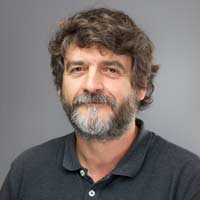 Juan José Coble Castro
Director del Máster en Energías Renovables y Eficiencia Energética
Juan José Coble Castro
Director del Máster en Energías Renovables y Eficiencia EnergéticaCoordinador y profesor de las áreas de Física y de Energía y Medio Ambiente Director of the Master in Renewable Energies and Energy Efficiency
Coordinator and professor of the areas of Physics and Energy and Environment Doctor Ingeniero Industrial por la UNED, especialidad Química. Ingeniero Industrial por la UPM, especialidad Química. Máster en Formación del Profesorado de ESO y Bachillerato, FP y Enseñanza de idiomas por la Universidad Nebrija.
Colabora en trabajos de investigación sobre termoeconomía y cuantificación del impacto ambiental aplicado al análisis de sistemas de producción de energía. Estas colaboraciones se siguen realizando en la actualidad con el departamento de Química aplicada a la Ingeniería Industrial de la UNED. Ha compaginado la actividad docente con labores de consultoría en temas de energía y medio ambiente (estudios de impacto ambiental, estudios de incidencia ambiental, estudios de generación y gestión de residuos, estudios energéticos, análisis de campo de contaminación electromagnética, etc.) con distintas empresas de consultoría del sector medioambiental.
 Gerardo Conejero Ortega
Coordinador del área de Energía
Gerardo Conejero Ortega
Coordinador del área de EnergíaProfesor de las áreas de Física, de Ingeniería Eléctrica y Electrónica, y de Energía Coordinator of the Energy area
Professor of the areas of Physics, Electrical and Electronic Engineering, and Energy Doctor por la Universidad Antonio de Nebrija. Ingeniero de Materiales por la Universidad Complutense de Madrid. Profesor de las asignaturas: Electromagnetismo, Física I y Física II en la Universidad Nebrija. Profesor de prácticas de Física I y Física II. Ha compaginado su labor docente con labores de investigación en el campo de los materiales, en la Universidad Nebrija y con el CENIM.
 Sergio Corbera Caraballo
Coordinador del área de Automóvil y Mecánica
Sergio Corbera Caraballo
Coordinador del área de Automóvil y MecánicaProfesor del área de Expresión Gráfica Coordinator of the Automobile and Mechanics area
Professor of the area of Graphic Expression Doctor en Tecnologías industriales e informáticas por la Universidad Nebrija. Ingeniero técnico Industrial, especialidad Mecánica, por la Universidad Politécnica de Madrid. Máster en Máquinas Avanzadas y Transportes por la Universidad Carlos III. Máster en Modelos y Métodos de Optimización por la UNED. Experiencia en el cálculo de estructuras en el sector aeronáutico. Cuatro años de experiencia en el desarrollo de motos de competición en la Universidad Politécnica de Madrid, consiguiendo el Premio a la Mejor Innovación Tecnológica en Motostudent 2012. Dos años de experiencia en el cálculo de estructuras en el sector aeronáutico. Seis años de experiencia en el desarrollo y optimización de estructuras para góndolas (Building Maintenance Units) mediante técnicas de inteligencia artificial. Responsable de simulación del departamento técnico de la empresa SAF Góndolas. Experiencia en el diseño y desarrollo de coches de altas prestaciones tipo fórmula (Catia y Dinámica Vehicular). Coordinador del Máster en Ingeniería de Vehículos de Competición y coordinador del proyecto Motostudent, de la Universidad Nebrija. Profesor e investigador de la Universidad Nebrija desde 2014. Su actividad investigadora se centra en el desarrollo de algoritmos de optimización basados en teorías evolutivas, redes neuronales e inteligencia artificial para la automatización del proceso de diseño de productos industriales, especialmente vehículos tipo motocicleta. Se trata de una línea de investigación completamente orientada al mundo de la industria.
 Alexandra Delgado Jiménez
Directora de Trabajos Fin de Grado
Director of End of Degree Projects
Doctora en Arquitectura por la Universidad Politécnica de Madrid. Arquitecta por la ETSA de Madrid en 2005. Accede al grado de Doctora en 2012 con su tesis doctoral "Evolución y crisis de la Región Metropolitana de Madrid 1985-2007. Análisis de las diversas perspectivas de la transformación del gobierno urbano: Una revisión crítica del planeamiento". Profesora de varios máster cuenta con numerosas publicaciones sobre las líneas de investigación y trabajo tanto en revistas españolas como extranjeras, así mismo, es autora, coautora y coordinadora de varios libros. Como profesional, dirige la Oficina de Arquitectura Urbana (AD arquitectura urbana), comprometida con la sostenibilidad urbana y territorial y centrada en el análisis e intervención con diferentes instrumentos y a diferentes escalas: arquitectura, urbanismo, territorio y paisaje. Ha redactado proyectos en áreas metropolitanas como Directrices Territoriales de Planeamiento y Planes Generales (Madrid, Ciudad Real, Talavera de la Reina, Seseña, Estepona, Parla, Yecla, Zafra, etc.), así como proyectos de edificios nuevos y rehabilitación; también proyectos de espacios públicos. Finalista en Europan 8: European Urbanity, con el proyecto “Extrabarrio” en Cáceres, en el equipo de Enrique Krahe Marina, ha recibido la Beca Bernd Steinacher 2013-2014 de METREX a jóvenes urbanistas.
Alexandra Delgado Jiménez
Directora de Trabajos Fin de Grado
Director of End of Degree Projects
Doctora en Arquitectura por la Universidad Politécnica de Madrid. Arquitecta por la ETSA de Madrid en 2005. Accede al grado de Doctora en 2012 con su tesis doctoral "Evolución y crisis de la Región Metropolitana de Madrid 1985-2007. Análisis de las diversas perspectivas de la transformación del gobierno urbano: Una revisión crítica del planeamiento". Profesora de varios máster cuenta con numerosas publicaciones sobre las líneas de investigación y trabajo tanto en revistas españolas como extranjeras, así mismo, es autora, coautora y coordinadora de varios libros. Como profesional, dirige la Oficina de Arquitectura Urbana (AD arquitectura urbana), comprometida con la sostenibilidad urbana y territorial y centrada en el análisis e intervención con diferentes instrumentos y a diferentes escalas: arquitectura, urbanismo, territorio y paisaje. Ha redactado proyectos en áreas metropolitanas como Directrices Territoriales de Planeamiento y Planes Generales (Madrid, Ciudad Real, Talavera de la Reina, Seseña, Estepona, Parla, Yecla, Zafra, etc.), así como proyectos de edificios nuevos y rehabilitación; también proyectos de espacios públicos. Finalista en Europan 8: European Urbanity, con el proyecto “Extrabarrio” en Cáceres, en el equipo de Enrique Krahe Marina, ha recibido la Beca Bernd Steinacher 2013-2014 de METREX a jóvenes urbanistas.
 Omar Díaz Luque
Profesor del área de Materiales
Professor of the Materials area
Graduado en Ciencias Físicas por la Universidad Complutense de Madrid, en la especialidad de Física Aplicada. Máster en Nanofísica y Materiales Avanzados por la misma Universidad. Doctorando en la Universidad Antonio de Nebrija. Ha realizado colaboraciones en actividades y proyectos con la Universidad Complutense, el Instituto de Magnetismo Aplicado y la Universidad Antonio de Nebrija.
Omar Díaz Luque
Profesor del área de Materiales
Professor of the Materials area
Graduado en Ciencias Físicas por la Universidad Complutense de Madrid, en la especialidad de Física Aplicada. Máster en Nanofísica y Materiales Avanzados por la misma Universidad. Doctorando en la Universidad Antonio de Nebrija. Ha realizado colaboraciones en actividades y proyectos con la Universidad Complutense, el Instituto de Magnetismo Aplicado y la Universidad Antonio de Nebrija.
 Ainhoa Ercoreca Llano
Profesora del área de estadística
Professor of the Statistics area
Licenciada en CC. Económicas y Empresariales en la Universidad Complutense de Madrid. Desde 1994, profesora asociada de Estadística en la Universidad Antonio de Nebrija en el departamento de Matemáticas y Ciencias Aplicadas. Desde 2000, profesora asociada en el departamento de Estadística en la Universidad Carlos III de Madrid y desde 2006 profesora asociada en el departamento de Organización Industrial en la Universidad de Comillas.
Ainhoa Ercoreca Llano
Profesora del área de estadística
Professor of the Statistics area
Licenciada en CC. Económicas y Empresariales en la Universidad Complutense de Madrid. Desde 1994, profesora asociada de Estadística en la Universidad Antonio de Nebrija en el departamento de Matemáticas y Ciencias Aplicadas. Desde 2000, profesora asociada en el departamento de Estadística en la Universidad Carlos III de Madrid y desde 2006 profesora asociada en el departamento de Organización Industrial en la Universidad de Comillas.
 Julio Fernández Sánchez-Manjavacas
Profesor de las áreas de Vehículos y de Fabricación
Professor of the Vehicle and Manufacturing areas
Ingeniero en Diseño Industrial. Máster en Ingeniería de Diseño Industrial (Universidad Nebrija). Jefe de Grupo de Lean Manufacturing, Métodos y Tiempos y documentación técnica en la fábrica de Aranjuez de Robert Bosch España. Previamente ha ocupado los puestos de responsable de calidad del área de DNOXTRONIC, donde fue el responsable del proyecto de traslado y puesta en marcha de las líneas de montaje de sensores de presión de “common rail” desde la empresa Mekutec en Albstadt (Alemania) a la fábrica de Bosch en Aranjuez. En su etapa inicial ha sido consultor en automoción en Jaguar-Land Rover (JMAC-Milán, Italia) y redactor de artículos técnicos de Fórmula Uno en Car and Driver. Fue uno de los fundadores del club del automóvil de la Universidad Nebrija.
Julio Fernández Sánchez-Manjavacas
Profesor de las áreas de Vehículos y de Fabricación
Professor of the Vehicle and Manufacturing areas
Ingeniero en Diseño Industrial. Máster en Ingeniería de Diseño Industrial (Universidad Nebrija). Jefe de Grupo de Lean Manufacturing, Métodos y Tiempos y documentación técnica en la fábrica de Aranjuez de Robert Bosch España. Previamente ha ocupado los puestos de responsable de calidad del área de DNOXTRONIC, donde fue el responsable del proyecto de traslado y puesta en marcha de las líneas de montaje de sensores de presión de “common rail” desde la empresa Mekutec en Albstadt (Alemania) a la fábrica de Bosch en Aranjuez. En su etapa inicial ha sido consultor en automoción en Jaguar-Land Rover (JMAC-Milán, Italia) y redactor de artículos técnicos de Fórmula Uno en Car and Driver. Fue uno de los fundadores del club del automóvil de la Universidad Nebrija.
 Alberto Franco De Frutos
Profesor del área de Vehículos
Professor of the Manufacturing area
Ingeniero Industrial por la UPM y Master Sc en Materiales por la Universidad de Manchester (GB). Ha desarrollado su labor profesional en las áreas de calidad, producción y dirección de operaciones en empresas internacionales de los sectores siderúrgico, auxiliar de automoción y bienes de equipo. Profesor de la Universidad Antonio de Nebrija en asignaturas de materiales y procesos. Profesor colaborador con la Universidad Carlos III.
Alberto Franco De Frutos
Profesor del área de Vehículos
Professor of the Manufacturing area
Ingeniero Industrial por la UPM y Master Sc en Materiales por la Universidad de Manchester (GB). Ha desarrollado su labor profesional en las áreas de calidad, producción y dirección de operaciones en empresas internacionales de los sectores siderúrgico, auxiliar de automoción y bienes de equipo. Profesor de la Universidad Antonio de Nebrija en asignaturas de materiales y procesos. Profesor colaborador con la Universidad Carlos III.
 Javier Freijo Martín
Profesor del área de Química
Professor of the Chemistry area
Doctor en Farmacia por la Universidad de Navarra y Master en Investigación y Desarrollo de Medicamentos. Miembro de la Sociedad Española de Química Terapéutica ha desarrollado proyectos de investigación en el diseño y síntesis de nuevas moléculas con actividad terapéutica. Desde el año 1999 ha centrado su actividad en la docencia universitaria.
Javier Freijo Martín
Profesor del área de Química
Professor of the Chemistry area
Doctor en Farmacia por la Universidad de Navarra y Master en Investigación y Desarrollo de Medicamentos. Miembro de la Sociedad Española de Química Terapéutica ha desarrollado proyectos de investigación en el diseño y síntesis de nuevas moléculas con actividad terapéutica. Desde el año 1999 ha centrado su actividad en la docencia universitaria.
 Sergio Galán Martín
Profesor del área de Matemáticas Aplicadas
Professor of the Applied Mathematics area
Graduado en Ingeniería Informática y Matemáticas por la Universidad Autónoma de Madrid. Máster en Ciberseguridad por la Universidad Carlos III de Madrid. Ha recibido varias becas y condecoraciones, como el premio al mejor expediente académico tanto de su titulación de grado como la de máster, o varias becas por rendimiento académico excelente de la Comunidad Autónoma de Madrid. Ha realizado trabajo de investigación en criptografía y privacidad, habiendo publicado recientemente un artículo en la revista IEEE Transactions on Dependable and Secure Computing.
Sergio Galán Martín
Profesor del área de Matemáticas Aplicadas
Professor of the Applied Mathematics area
Graduado en Ingeniería Informática y Matemáticas por la Universidad Autónoma de Madrid. Máster en Ciberseguridad por la Universidad Carlos III de Madrid. Ha recibido varias becas y condecoraciones, como el premio al mejor expediente académico tanto de su titulación de grado como la de máster, o varias becas por rendimiento académico excelente de la Comunidad Autónoma de Madrid. Ha realizado trabajo de investigación en criptografía y privacidad, habiendo publicado recientemente un artículo en la revista IEEE Transactions on Dependable and Secure Computing.
 Javier García Martín
Profesor del área de Ingeniería Eléctrica y Electrónica
Professor of the area of Electrical and Electronic Engineering
Ingeniero Industrial por la UNED, Ingeniero Técnico Industrial por la UPM y Project Management Professional por el PMI.
Javier García Martín
Profesor del área de Ingeniería Eléctrica y Electrónica
Professor of the area of Electrical and Electronic Engineering
Ingeniero Industrial por la UNED, Ingeniero Técnico Industrial por la UPM y Project Management Professional por el PMI.
Más de 23 años de experiencia laboral liderando equipos multidisciplinares y gestionando proyectos internacionales de Energía (Oil & Gas, Generación Convencional y Renovable, T&D) y otros sectores industriales en todas sus fases, desempeñando labores técnicas y de gestión, con especial dedicación a la dirección estratégica, gestión de contratos, gestión de la calidad, estandarización y optimización de procesos y métodos, mejora continua, generación de valor, cadena de suministro, ingeniería, energía, electricidad e instrumentación y control.
Cuenta con amplia experiencia docente adquirida con alumnado universitario y preuniversitario en ámbito particular y academias privadas, así como durante la realización de su actividad profesional en la empresa privada, la cual compagina con la actividad docente, donde aporta su amplia experiencia laboral. Actualmente profesor asociado en la Escuela Politécnica de la Universidad Antonio de Nebrija.
 Aránzazu Garitagoitia Cid
Coordinadora y profesora del área de Materiales
Coordinator and professor of the Materials area
Doctora en Física de Materiales y Licenciada en Ciencias Químicas. Intensa trayectoria en investigación, industria alemana y docencia, desarrollada principalmente en Dresde (Alemania). Profesora en el seminario Nanoanalytik, organizado por la Deutsche Gesellschaft für Materialkünde (DGM), asociación alemana de Ciencias de Materiales. Investigadora asistente en el proyecto industrial Estudio de las características y aplicaciones del detector EsB en colaboración con el fabricante de microscopios electrónicos y lentes Carl Zeiss GmbH. Publicaciones: A. Garitagoitia Cid, R. Rosenkranz, M. Löffler, A. Clausner, Y. Standke, E. Zschech, Ultramicroscopy, 2018, 195, 47-52. A. Garitagoitia Cid, E. Moayedi, R. Rosenkranz, A. Clausner, K. Pakbaz, E. Zschech, IEEE Transactions on Device and Materials Reliability, 2016, Vol. 16, Nº 4, 461-464.
Aránzazu Garitagoitia Cid
Coordinadora y profesora del área de Materiales
Coordinator and professor of the Materials area
Doctora en Física de Materiales y Licenciada en Ciencias Químicas. Intensa trayectoria en investigación, industria alemana y docencia, desarrollada principalmente en Dresde (Alemania). Profesora en el seminario Nanoanalytik, organizado por la Deutsche Gesellschaft für Materialkünde (DGM), asociación alemana de Ciencias de Materiales. Investigadora asistente en el proyecto industrial Estudio de las características y aplicaciones del detector EsB en colaboración con el fabricante de microscopios electrónicos y lentes Carl Zeiss GmbH. Publicaciones: A. Garitagoitia Cid, R. Rosenkranz, M. Löffler, A. Clausner, Y. Standke, E. Zschech, Ultramicroscopy, 2018, 195, 47-52. A. Garitagoitia Cid, E. Moayedi, R. Rosenkranz, A. Clausner, K. Pakbaz, E. Zschech, IEEE Transactions on Device and Materials Reliability, 2016, Vol. 16, Nº 4, 461-464.
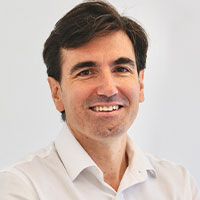 Jorge González de la Fuente
Director del Grado en Ingeniería en Tecnologías Industriales
Jorge González de la Fuente
Director del Grado en Ingeniería en Tecnologías IndustrialesProfesor del área de Ingeniería Eléctrica y Electrónica Director of the Bachelor's Degree in Industrial Technology Engineering
Professor of the area of Electrical and Electronic Engineering Ingeniero Industrial Superior por la Universidad de Valladolid, certificado en Project Management por el Project Management Institute, Coach profesional por ASESCO, Mentor profesional con más de 5 años de experiencia con jóvenes universitarios en sus procesos de incorporación al mercado laboral, emprendedor y fundador de NextPlay, empresa del sector educativo con una solución que permite que los jóvenes alumnos reciban una orientación formativo-laboral adecuada a sus necesidades, con casi 20 años de experiencia internacional en puestos de responsabilidad como Consultor, Project Manager, Key Account Manager y Director Comercial en los sectores de Automoción, Logística, Alimentación y Metalurgia.
 Raquel González Nieto
Profesora del área de Procesos Industriales
Professor of the Industrial Processes area
Ingeniera Industrial Mecánica por la Universidad de Castilla la Mancha. Máster Oficial Universitario en Energías Renovables y Eficiencia Energética por la UDIMA. Recibió el premio ACCIONA al mejor proyecto fin de carrera del año 2015. Máster Universitario en Profesor de Educación Secundaria Obligatoria y Bachillerato, Formación Profesional y Enseñanza de Idiomas. En el ámbito laboral ha trabajado como ingeniera en Creara Consultores S.L en distintos puestos en torno a las auditorías energéticas. Actualmente desarrolla su labor como docente en formación profesional en el departamento de Mecanizado y Mantenimiento del Colegio Salesianos Atocha.
Raquel González Nieto
Profesora del área de Procesos Industriales
Professor of the Industrial Processes area
Ingeniera Industrial Mecánica por la Universidad de Castilla la Mancha. Máster Oficial Universitario en Energías Renovables y Eficiencia Energética por la UDIMA. Recibió el premio ACCIONA al mejor proyecto fin de carrera del año 2015. Máster Universitario en Profesor de Educación Secundaria Obligatoria y Bachillerato, Formación Profesional y Enseñanza de Idiomas. En el ámbito laboral ha trabajado como ingeniera en Creara Consultores S.L en distintos puestos en torno a las auditorías energéticas. Actualmente desarrolla su labor como docente en formación profesional en el departamento de Mecanizado y Mantenimiento del Colegio Salesianos Atocha.
 Carlos Gumiel Vindel
Vicedecano de investigación de la EPS
Carlos Gumiel Vindel
Vicedecano de investigación de la EPSCoordinador del área de Química. Profesor del área de Materiales Vice Dean of Research at the EPS
Director of the Degree in Engineering in Industrial Technologies
Coordinator of the Chemistry area. Professor of the Materials area Doctor por la Universidad Politécnica de Madrid y Licenciado en Ciencias Químicas por la Universidad Complutense de Madrid. Máster en Nanociencia y Nanomateriales también por la Universidad Complutense de Madrid. Años de experiencia investigadora en el Instituto de Cerámica y Vidrio del CSIC en colaboración con el Instituto de Ciencia de Materiales de Madrid (CSIC) y con el "Inorganic and Physical Chemistry Research Group" de la Universidad de Hasselt, Bélgica. Experto en el procesamiento de láminas delgadas de materiales cerámicos multiferroicos obtenidas por métodos sostenibles basados en disoluciones acuosas y con potenciales aplicaciones en la industria electrónica. Organizador del Congreso bienal de "Electrocerámica" y miembro de la Sociedad Española de Cerámica y Vidrio desde 2015. Acreditado para las figuras docentes de Profesor Ayudante Doctor, Profesor Contratado Doctor y Profesor de Universidad Privada por la ANECA. Profesor Asociado en el Dpto. de Ciencia e Ingeniería de Materiales e Ingeniería Química de la Universidad Carlos III de Madrid desde septiembre de 2019, con experiencia docente adicional en la ETSI de Telecomunicación de la Universidad Politécnica de Madrid y en la Facultad de Ciencias Químicas de la Universidad Complutense de Madrid, donde participó en un Proyecto de Innovación y Mejora de la Calidad Docente. Primer premio a la mejor ponencia en el Congreso Internacional "The 7th Global Conference on Materials Science and Engineering” celebrado en Xian (China) en 2018 y 2º Premio en el V Concurso de Divulgación Científica por el Proyecto de Innovación y Mejora de la Calidad Docente (Universidad Complutense de Madrid, 2014). Actualmente, Director del Grado en Ingeniería en Tecnologías Industriales, Profesor Titular e Investigador en el Grupo de Materiales y Fabricación Aditiva (MOD3RN) en la Escuela Politécnica Superior de la Universidad Nebrija.
 Jesús Guzmán Mínguez
Profesor de las áreas de Química y de Materiales
Professor of the areas of Chemistry and Materials
Doctor en Física de los Materiales por la Universidad Autónoma de Madrid (UAM) y Licenciado en Ciencias Químicas por la Universidad Complutense de Madrid (UCM). Máster en Ciencia y Tecnología de Nuevos Materiales (CyTNM) por la Universidad de Sevilla (US). El doctorado fue realizado en el Instituto de Cerámica y Vidrio que pertenece al CSIC. Acreditado para las figuras docentes de Profesor Contratado Doctor y Profesor de Universidad Privada por la ANECA. Experto en el procesamiento de cerámicas funcionales con propiedades magnéticas obtenidas por métodos sostenibles como la síntesis de combustión a baja temperatura, así como el diseño de nuevos imanes permanentes que son potencialmente útiles para la sustitución de imanes basados en Tierras Raras. Miembro de la Sociedad Española de Cerámica y Vidrio desde 2017. Primer premio a la mejor ponencia en el Congreso de Jóvenes Investigadores del ICV-CSIC (2017). Investigador en el Grupo de Materiales y Fabricación Aditiva (MOD3RN) y profesor en la Escuela Politécnica Superior de la Universidad Nebrija.
Jesús Guzmán Mínguez
Profesor de las áreas de Química y de Materiales
Professor of the areas of Chemistry and Materials
Doctor en Física de los Materiales por la Universidad Autónoma de Madrid (UAM) y Licenciado en Ciencias Químicas por la Universidad Complutense de Madrid (UCM). Máster en Ciencia y Tecnología de Nuevos Materiales (CyTNM) por la Universidad de Sevilla (US). El doctorado fue realizado en el Instituto de Cerámica y Vidrio que pertenece al CSIC. Acreditado para las figuras docentes de Profesor Contratado Doctor y Profesor de Universidad Privada por la ANECA. Experto en el procesamiento de cerámicas funcionales con propiedades magnéticas obtenidas por métodos sostenibles como la síntesis de combustión a baja temperatura, así como el diseño de nuevos imanes permanentes que son potencialmente útiles para la sustitución de imanes basados en Tierras Raras. Miembro de la Sociedad Española de Cerámica y Vidrio desde 2017. Primer premio a la mejor ponencia en el Congreso de Jóvenes Investigadores del ICV-CSIC (2017). Investigador en el Grupo de Materiales y Fabricación Aditiva (MOD3RN) y profesor en la Escuela Politécnica Superior de la Universidad Nebrija.
 Julián Jiménez Reinosa
Profesor del área de Química
Professor of the Chemistry area
Licenciado y Doctor en CC. Químicas y por la Universidad Autónoma de Madrid. Desarrolla su actividad investigadora en el Instituto de Cerámica y Vidrio (CSIC), ha publicado más de 40 artículos de investigación y ha participado en 7 patentes de invención, 6 de ellas licenciadas. Su trabajo se centra en la obtención de materiales multifuncionales a partir de la dispersión y aplicación de nanopartículas evitando los posibles efectos para la salud que éstas presentan. Los desarrollos en los que ha participado han dado lugar a la creación de 2 spin-off (Ad-Particles y Encapsulae), activas en la actualidad, a 2 premios distinguidos Alfa de Oro en el sector cerámico y a productos comerciales como esmaltes para baldosas cerámicas (cerámicas más sostenibles con nuevas funcionalidades), protectores solares (nuevos filtros UV inorgánicos con mayor rendimiento) o catalizadores (ahorro de Pt en procesos de combustión de hollín).
Desde el punto de vista de la formación científica, ha finalizado la formación científica de 14 estudiantes y ha dirigido la formación científico-tecnológica de 1 doctorado. Es miembro de la Sociedad Española de Cerámica y Vidrio y Profesor Asociado en el Dpto. de Ciencia e Ingeniería de Materiales e Ingeniería Química de la Universidad Carlos III de Madrid.
Julián Jiménez Reinosa
Profesor del área de Química
Professor of the Chemistry area
Licenciado y Doctor en CC. Químicas y por la Universidad Autónoma de Madrid. Desarrolla su actividad investigadora en el Instituto de Cerámica y Vidrio (CSIC), ha publicado más de 40 artículos de investigación y ha participado en 7 patentes de invención, 6 de ellas licenciadas. Su trabajo se centra en la obtención de materiales multifuncionales a partir de la dispersión y aplicación de nanopartículas evitando los posibles efectos para la salud que éstas presentan. Los desarrollos en los que ha participado han dado lugar a la creación de 2 spin-off (Ad-Particles y Encapsulae), activas en la actualidad, a 2 premios distinguidos Alfa de Oro en el sector cerámico y a productos comerciales como esmaltes para baldosas cerámicas (cerámicas más sostenibles con nuevas funcionalidades), protectores solares (nuevos filtros UV inorgánicos con mayor rendimiento) o catalizadores (ahorro de Pt en procesos de combustión de hollín).
Desde el punto de vista de la formación científica, ha finalizado la formación científica de 14 estudiantes y ha dirigido la formación científico-tecnológica de 1 doctorado. Es miembro de la Sociedad Española de Cerámica y Vidrio y Profesor Asociado en el Dpto. de Ciencia e Ingeniería de Materiales e Ingeniería Química de la Universidad Carlos III de Madrid.
 Ingo Kaiser
Profesor del área de Fundamentos de la Física
Professor of the Fundamentals of Physics area
Doctor Ingeniero por la Facultad de Ingeniería Mecánica de la Universidad Hannover (Alemania). Colaborador científico e investigador asistente en la Universidad de Hannover (Alemania) y en el Centro Aeroespacial Alemán (DLR) Oberpfaffenhofen (Alemania, cerca de Munich). Además, era vice-director del DLR_School_Lab (Laboratorio de Escuela) Oberpfaffenhofen. Su investigación está focalizada en la simulación computacional de vehículos ferroviarios. Sus estudios se centran en la modelización de ejes montados y carriles como cuerpos flexibles y en la modelización detallada del contacto rueda - carril. Su investigación científica incluye sistemas multicuerpos, elementos finitos y métodos numéricos. Más de once publicaciones en revistas científicas JCR. Revisor de artículos científicos para varias revistas científicas (Vehicle System Dynamics, Multibody System Dynamics, Wear, etc.). Un sexenio de investigación reconocido.
En 2004 recibió el IUTAM Bureau Prize (premio de la oficina de la International Union of Theoretical and Applied Mechanics para investigadores jóvenes) por su trabajo “The running behaviour of an elastic wheelset” presentado en el ICTAM 2004 (International Congress of Theoretical and Applied Mechanics) en Warszawa (Polonia). Presentó su trabajo científico también en los congresos de IAVSD (International Association for Vehicle System Dynamics) en 2005 en Milano (Italia), en 2011 en Manchester (Reino Unido) y 2015 en Graz (Austria) y en las conferencias internacionales de tecnología ferroviaria (International Conference on Railway Technology) en 2012 en Las Palmas de Gran Canaria, en 2016 en Cagliari (Italia) y en 2018 en Sitges. Ponente invitado en la International Conference on Railway Technology en 2018.
Comenzó su actividad docente en el año 2012 como docente colaborador habitual en la Rolling Stock Summer School, celebrada en Kraków (Polonia) en 2012 y 2014, y en Lecco (Italia, cerca de Milano) en 2016, donde presentó sus estudios sobre la modelización del contacto rueda - carril y el uso del programa multicuerpo profesional Simpack. Es profesor de la Universidad Nebrija desde el año 2018.
Ingo Kaiser
Profesor del área de Fundamentos de la Física
Professor of the Fundamentals of Physics area
Doctor Ingeniero por la Facultad de Ingeniería Mecánica de la Universidad Hannover (Alemania). Colaborador científico e investigador asistente en la Universidad de Hannover (Alemania) y en el Centro Aeroespacial Alemán (DLR) Oberpfaffenhofen (Alemania, cerca de Munich). Además, era vice-director del DLR_School_Lab (Laboratorio de Escuela) Oberpfaffenhofen. Su investigación está focalizada en la simulación computacional de vehículos ferroviarios. Sus estudios se centran en la modelización de ejes montados y carriles como cuerpos flexibles y en la modelización detallada del contacto rueda - carril. Su investigación científica incluye sistemas multicuerpos, elementos finitos y métodos numéricos. Más de once publicaciones en revistas científicas JCR. Revisor de artículos científicos para varias revistas científicas (Vehicle System Dynamics, Multibody System Dynamics, Wear, etc.). Un sexenio de investigación reconocido.
En 2004 recibió el IUTAM Bureau Prize (premio de la oficina de la International Union of Theoretical and Applied Mechanics para investigadores jóvenes) por su trabajo “The running behaviour of an elastic wheelset” presentado en el ICTAM 2004 (International Congress of Theoretical and Applied Mechanics) en Warszawa (Polonia). Presentó su trabajo científico también en los congresos de IAVSD (International Association for Vehicle System Dynamics) en 2005 en Milano (Italia), en 2011 en Manchester (Reino Unido) y 2015 en Graz (Austria) y en las conferencias internacionales de tecnología ferroviaria (International Conference on Railway Technology) en 2012 en Las Palmas de Gran Canaria, en 2016 en Cagliari (Italia) y en 2018 en Sitges. Ponente invitado en la International Conference on Railway Technology en 2018.
Comenzó su actividad docente en el año 2012 como docente colaborador habitual en la Rolling Stock Summer School, celebrada en Kraków (Polonia) en 2012 y 2014, y en Lecco (Italia, cerca de Milano) en 2016, donde presentó sus estudios sobre la modelización del contacto rueda - carril y el uso del programa multicuerpo profesional Simpack. Es profesor de la Universidad Nebrija desde el año 2018.
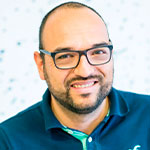 Jesús Omar La Cruz Jucht
Profesor del área de Ingeniería Eléctrica y Electrónica
Professor of the area of Electrical and Electronic Engineering
Doctor en Ingeniería Electrónica por la Universidad Politécnica de Valencia. Obtuvo el título de Ingeniero Electricista por la Universidad de Los Andes (ULA, Venezuela) en 2009, Master y Doctorado en Ingeniería Electrónica por la Universidad Politécnica de Valencia (2013 y 2016, respectivamente). Profesor en el área de electrónica y comunicaciones en la ULA (2010-2017). Actualmente Ingeniero de Investigación en la Fundación IMDEA Networks en Madrid desde 2017. Su trabajo en investigación se ha centrado en la implementación de sistemas de muy alta velocidad de procesado de señal y comunicaciones digitales en dispositivos FPGA, específicamente codificación de canal y sistemas de comunicaciones en la banda de onda milimétrica.
Jesús Omar La Cruz Jucht
Profesor del área de Ingeniería Eléctrica y Electrónica
Professor of the area of Electrical and Electronic Engineering
Doctor en Ingeniería Electrónica por la Universidad Politécnica de Valencia. Obtuvo el título de Ingeniero Electricista por la Universidad de Los Andes (ULA, Venezuela) en 2009, Master y Doctorado en Ingeniería Electrónica por la Universidad Politécnica de Valencia (2013 y 2016, respectivamente). Profesor en el área de electrónica y comunicaciones en la ULA (2010-2017). Actualmente Ingeniero de Investigación en la Fundación IMDEA Networks en Madrid desde 2017. Su trabajo en investigación se ha centrado en la implementación de sistemas de muy alta velocidad de procesado de señal y comunicaciones digitales en dispositivos FPGA, específicamente codificación de canal y sistemas de comunicaciones en la banda de onda milimétrica.
 Javier Lázaro Ortega
Profesor del área de Materiales
Professor of the Materials area
Graduado en Ingeniería Aeroespacial por la Universidad Politécnica de Madrid. Máster Universitario en Ingeniería Aeroespacial por la Universidad Europea de Madrid en enero de 2024. Consultor de Ingeniería de cálculo y simulación durante tres años, responsable de la consultaría de software de cálculos estructurales (FEM) y fluidodinámicos (CFD). Tutor privado de decenas de estudiantes preuniversitarios en materias de ciencias durante ocho años.
Javier Lázaro Ortega
Profesor del área de Materiales
Professor of the Materials area
Graduado en Ingeniería Aeroespacial por la Universidad Politécnica de Madrid. Máster Universitario en Ingeniería Aeroespacial por la Universidad Europea de Madrid en enero de 2024. Consultor de Ingeniería de cálculo y simulación durante tres años, responsable de la consultaría de software de cálculos estructurales (FEM) y fluidodinámicos (CFD). Tutor privado de decenas de estudiantes preuniversitarios en materias de ciencias durante ocho años.
 Carlos Lli Torrabadella
Profesor del área de empresa
Carlos Lli Torrabadella
Profesor del área de empresaCoordinador de investigación de la Escuela Politécnica Superior Professor of the business area
Research coordinator of the Higher Polytechnic School PhD en Dirección de Empresas Internacionales por la Universidad Nebrija, MBA-I / MIM por Thunderbird (AZ, EEUU), Especialista en Finanzas (Univ. Sta. María), Ingeniero Civil (Univ. Carabobo). Ha sido profesor de Grado y Posgrado en: Dirección de Operaciones, Internacionalización, Ingeniería Económica, Análisis de Entorno, Modelos de Desarrollo, Toma de decisiones con aplicaciones informáticas, Fundamentos de Economía, entre otras. Su experiencia profesional se ha desarrollado en el área industrial en las áreas de Gerencia de Planta, Operaciones, Calidad. Proyectos y Desarrollo de Negocios, con base en España, Latinoamérica y EEUU. Ha trabajado a nivel corporativo (Ford, Venepal, Bancoex) como en PYMES. Su área de investigación se centra en Modelos de Negocios, offshoring y servicios de alto valor añadido.
 Iker Lopez Consuegra
Profesor del área de Expresión Gráfica
Professor of the area of Graphic Expression
Iker López Consuegra, nacido en Bilbao en 1979, acabó sus estudios de arquitectura en la Universidad Europea de Madrid y años más tarde empezó sus estudios de Doctorado en la escuela de arquitectura de la Universidad Politécnica de Madrid. Ha colaborado con diversos estudios españoles como Empty, Izaskun Chinchilla, Fernando Menis, IDOM ACXT, Recetas Urbanas y Rueda Pizarro entre otros, centrándose en la investigación y en la ejecución de concursos de arquitectura.
Iker Lopez Consuegra
Profesor del área de Expresión Gráfica
Professor of the area of Graphic Expression
Iker López Consuegra, nacido en Bilbao en 1979, acabó sus estudios de arquitectura en la Universidad Europea de Madrid y años más tarde empezó sus estudios de Doctorado en la escuela de arquitectura de la Universidad Politécnica de Madrid. Ha colaborado con diversos estudios españoles como Empty, Izaskun Chinchilla, Fernando Menis, IDOM ACXT, Recetas Urbanas y Rueda Pizarro entre otros, centrándose en la investigación y en la ejecución de concursos de arquitectura.En 2007 fue cofundador del colectivo Mórula que tiempo después se convirtió en Mórula Arquitectura. Seis años más tarde decide emprender una nueva etapa en solitario creando la oficina Iker López Arquitectura enfocada a la investigación y proyectos singulares mientras lo compagina con colaboraciones con otros arquitectos y trabajos de fotografía. Actualmente maneja dos líneas de investigación basadas en la emergencia y en la museografía y espacios expositivos aprovechando su experiencia en ambos ámbitos. Parte de su trabajo y colaboraciones se han visto publicados en medios nacionales como El País, Radio Nacional de España, Paisea y Vía Construcción entre otros.
 María Mateos Castellano
Profesora del área de Matemáticas Aplicadas
Professor of the Applied Mathematics area
Graduada en Ciencias Matemáticas por la Universidad Complutense de Madrid. Actualmente está cursando el Master Universitario en formación del profesorado de educación secundaria en la Universidad Complutense de Madrid. Profesionalmente, ha realizado prácticas en la empresa de Avanade, con un puesto en el departamento del Desarrollo del Software. Ha impartido clases particulares a lo largo de sus estudios y también he estado trabajando de profesora para la academia Club Aprender a Aprender.
María Mateos Castellano
Profesora del área de Matemáticas Aplicadas
Professor of the Applied Mathematics area
Graduada en Ciencias Matemáticas por la Universidad Complutense de Madrid. Actualmente está cursando el Master Universitario en formación del profesorado de educación secundaria en la Universidad Complutense de Madrid. Profesionalmente, ha realizado prácticas en la empresa de Avanade, con un puesto en el departamento del Desarrollo del Software. Ha impartido clases particulares a lo largo de sus estudios y también he estado trabajando de profesora para la academia Club Aprender a Aprender.
 Danilo Magistrali
Profesor del área de Matemáticas
Professor of mathematics
Doctor por la Universidad Complutense de Madrid. Licenciado en Físico-Química, DEA en Física. Profesor del área de Matemáticas en la Universidad Antonio Nebrija. Desde el 2005 da clase de matemáticas en Ingeniería, ADE, Arquitectura en varias universidades: UPM, UC3M, UPNA, UPCO. Ha publicado libros y cuadernos de apoyo a la docencia en el ámbito de la matemática aplicada y de la historia de la ciencia.
Danilo Magistrali
Profesor del área de Matemáticas
Professor of mathematics
Doctor por la Universidad Complutense de Madrid. Licenciado en Físico-Química, DEA en Física. Profesor del área de Matemáticas en la Universidad Antonio Nebrija. Desde el 2005 da clase de matemáticas en Ingeniería, ADE, Arquitectura en varias universidades: UPM, UC3M, UPNA, UPCO. Ha publicado libros y cuadernos de apoyo a la docencia en el ámbito de la matemática aplicada y de la historia de la ciencia.
 Constantino Malagón Luque
Profesor del área de Física
Professor of the Physics area
Doctor por la Universidad Nebrija y licenciado en Ciencias Físicas por la Universidad Complutense de Madrid. Posee una amplísima experiencia de más de veinte años como profesor en la Universidad. Su tesis doctoral se desarrolló en el campo de la Astrofísica de altas energías, con la aplicación de técnicas de clasificación basadas en aprendizaje automático a imágenes obtenidas por el telescopio MAGIC, situado en el observatorio Roque de los Muchachos. Además, ha desarrollado su labor investigadora en proyectos internacionales financiados en áreas como el reconocimiento automático de caracteres en documentos médicos medievales.
Constantino Malagón Luque
Profesor del área de Física
Professor of the Physics area
Doctor por la Universidad Nebrija y licenciado en Ciencias Físicas por la Universidad Complutense de Madrid. Posee una amplísima experiencia de más de veinte años como profesor en la Universidad. Su tesis doctoral se desarrolló en el campo de la Astrofísica de altas energías, con la aplicación de técnicas de clasificación basadas en aprendizaje automático a imágenes obtenidas por el telescopio MAGIC, situado en el observatorio Roque de los Muchachos. Además, ha desarrollado su labor investigadora en proyectos internacionales financiados en áreas como el reconocimiento automático de caracteres en documentos médicos medievales.
 Carolina Mendoza Parra
Directora del Grado en Matemáticas Aplicadas
Carolina Mendoza Parra
Directora del Grado en Matemáticas AplicadasProfesora del área de Matemáticas Director of the Degree in Applied Mathematics
Professor of the Mathematics area Doctora por la Universidad de Navarra. Actualmente trabaja en flujos geofísicos en oceános y atmósfera. En particular, en el desarrollo de descriptores Lagrangianos para localizar estructuras coherentes en la superficie del Mar mediante datos satelitales. Acreditada como Profesor titular. Ha realizado estancias post-doctorales en el Instituto Nazionalle di Ottica (Florencia) Italia trabajando en sincronización de cadenas de osciladores, en el Instituto Max-Planck de Sistemas Complejos (Dresde)-Alemania y como profesor visitante en la Facultad de Earth, Ocean, & Environment de la Universidad de Delaware.
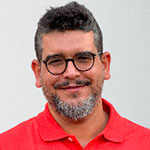 Carlos Mestre Cebrián
Profesor del área de Fundamentos de Informática
Professor of the Computer Fundamentals area
Ingeniero técnico en telecomunicaciones especialidad en telemática por la Universidad Politécnica de Valencia. Bachelors Degree en “Mobile communications & Electronics” por el antiguo AIT (Athlone Institute of Technology), actualmente TUS (Technological University of the Shannon). Tras siete años como ingeniero de software a tiempo completo en 2020 empezó a impartir formación para el Servicio Público de Empleo Estatal (SEPE) en la provincia de Guadalajara (certificados de profesionalidad impartidos, IFCT0310 - Administración de bases de datos; IFCT0609 - Programación de sistemas informáticos), además de otros cursos no oficiales como alfabetización digital, administración de BBDD y SAP y para entidades como Cruz Roja.
Carlos Mestre Cebrián
Profesor del área de Fundamentos de Informática
Professor of the Computer Fundamentals area
Ingeniero técnico en telecomunicaciones especialidad en telemática por la Universidad Politécnica de Valencia. Bachelors Degree en “Mobile communications & Electronics” por el antiguo AIT (Athlone Institute of Technology), actualmente TUS (Technological University of the Shannon). Tras siete años como ingeniero de software a tiempo completo en 2020 empezó a impartir formación para el Servicio Público de Empleo Estatal (SEPE) en la provincia de Guadalajara (certificados de profesionalidad impartidos, IFCT0310 - Administración de bases de datos; IFCT0609 - Programación de sistemas informáticos), además de otros cursos no oficiales como alfabetización digital, administración de BBDD y SAP y para entidades como Cruz Roja.
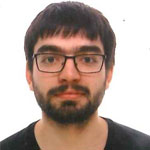 Álvaro Pereira Albert
Profesor del área de Matemáticas
Professor of Mathematics area
Graduado en Matemáticas por la Universidad Autónoma de Madrid. Está cursando actualmente el Máster universitario en formación del profesorado de educación secundaria obligatoria y bachillerato, formación profesional y enseñanzas de idiomas. Profesor asociado en la Escuela Politécnica Superior de la Universidad Nebrija.
Álvaro Pereira Albert
Profesor del área de Matemáticas
Professor of Mathematics area
Graduado en Matemáticas por la Universidad Autónoma de Madrid. Está cursando actualmente el Máster universitario en formación del profesorado de educación secundaria obligatoria y bachillerato, formación profesional y enseñanzas de idiomas. Profesor asociado en la Escuela Politécnica Superior de la Universidad Nebrija.
 Oscar Arístides Redondo Martínez de Pinillos
Profesor del área de competencias profesionales
Professor of the area of professional skills
Licenciado en Sociología por la Universidad Complutense de Madrid, Master en Gestión de la Calidad por la EOI (Escuela de Organización Industrial) y Master en Gestión Comercial y Marketing por ESIC Business School. Es consultor y formador en Estrategia, Marketing y Operaciones. Ha sido Director de Organización y Marketing en AFAR-4 y consultor en diversas organizaciones, conduciendo proyectos en España y en el extranjero (Guatemala, Reino Unido, Vietnam). Es profesor en la Universidad de Nebrija impartiendo clases de Competencias Profesionales. Profesor y Director de programas en organizaciones como Formato educativo, IE University, ESIC y otras. En la actualidad es Socio Director de BESSER Consulting.
Oscar Arístides Redondo Martínez de Pinillos
Profesor del área de competencias profesionales
Professor of the area of professional skills
Licenciado en Sociología por la Universidad Complutense de Madrid, Master en Gestión de la Calidad por la EOI (Escuela de Organización Industrial) y Master en Gestión Comercial y Marketing por ESIC Business School. Es consultor y formador en Estrategia, Marketing y Operaciones. Ha sido Director de Organización y Marketing en AFAR-4 y consultor en diversas organizaciones, conduciendo proyectos en España y en el extranjero (Guatemala, Reino Unido, Vietnam). Es profesor en la Universidad de Nebrija impartiendo clases de Competencias Profesionales. Profesor y Director de programas en organizaciones como Formato educativo, IE University, ESIC y otras. En la actualidad es Socio Director de BESSER Consulting.
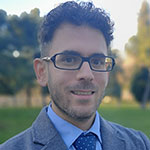 Miguel Ángel Reyes Belmonte
Coordinador y profesor de las áreas de Fundamentos de la Física y de Energía
Coordinator and professor of the areas of Fundamentals of Physics and Energy
Doctor Ingeniero Industrial y Máster en Motores de Combustión Interna Alternativos por la Universidad Politécnica de Valencia (UPV). Más de 10 años de experiencia profesional en el sector de la automoción, simulación de sistemas energéticos complejos, turbomaquinaria, análisis CFD, optimización termodinámica y energías renovables.
Profesor universitario acreditado a las figuras de Titular de Universidad, Contratado Doctor y Profesor de Universidad Privada por la ANECA. Dos sexenios de investigación reconocidos y acreditación para la docencia universitaria en inglés. Amplia experiencia docente y de supervisión con más de 50 trabajos académicos entre trabajos fin de grado (TFG), fin de máster (TFM) y tesis doctorales.
Colaborador científico para la Agencia de Certificación en Innovación Española (ACIE), editor de varios números especiales en revistas del ramo de la energía y autor de más de 40 publicaciones científicas en revistas indexadas y congresos internacionales. Participación en más de 15 proyectos de investigación a nivel europeo, nacional, regional y contratos con empresas en el ámbito de la automoción y la energía.
Miguel Ángel Reyes Belmonte
Coordinador y profesor de las áreas de Fundamentos de la Física y de Energía
Coordinator and professor of the areas of Fundamentals of Physics and Energy
Doctor Ingeniero Industrial y Máster en Motores de Combustión Interna Alternativos por la Universidad Politécnica de Valencia (UPV). Más de 10 años de experiencia profesional en el sector de la automoción, simulación de sistemas energéticos complejos, turbomaquinaria, análisis CFD, optimización termodinámica y energías renovables.
Profesor universitario acreditado a las figuras de Titular de Universidad, Contratado Doctor y Profesor de Universidad Privada por la ANECA. Dos sexenios de investigación reconocidos y acreditación para la docencia universitaria en inglés. Amplia experiencia docente y de supervisión con más de 50 trabajos académicos entre trabajos fin de grado (TFG), fin de máster (TFM) y tesis doctorales.
Colaborador científico para la Agencia de Certificación en Innovación Española (ACIE), editor de varios números especiales en revistas del ramo de la energía y autor de más de 40 publicaciones científicas en revistas indexadas y congresos internacionales. Participación en más de 15 proyectos de investigación a nivel europeo, nacional, regional y contratos con empresas en el ámbito de la automoción y la energía.
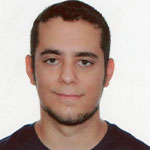 David Rincón Dávila
Profesor del área de Vehículos
Professor of the Vehicle area
Máster Ingeniero Industrial por la Universidad Politécnica de Madrid. Investigador del INSIA - UPM desde 2016 en la división de Ingeniería de vehículos de transporte colectivo, industriales y especiales. Profesor de diversas asignaturas en el Máster en Ingeniería de Automoción de la UPM desde el año 2016 hasta la actualidad, así como director de trabajos fin de grado/máster. Actualmente también es profesor asociado de la Escuela Politécnica Superior de la Universidad Nebrija.
Ha participado en proyectos de investigación en áreas relacionadas con la seguridad de vehículos de grandes dimensiones y material rodante ferroviario. Autor de publicaciones en congresos nacionales e internacionales, así como en revistas de alto índice de impacto.
Desarrolla su actividad profesional como técnico de ensayos de reglamentación europea, siendo experto en simulación, instrumentación y realización de ensayos de vehículos y componentes.
David Rincón Dávila
Profesor del área de Vehículos
Professor of the Vehicle area
Máster Ingeniero Industrial por la Universidad Politécnica de Madrid. Investigador del INSIA - UPM desde 2016 en la división de Ingeniería de vehículos de transporte colectivo, industriales y especiales. Profesor de diversas asignaturas en el Máster en Ingeniería de Automoción de la UPM desde el año 2016 hasta la actualidad, así como director de trabajos fin de grado/máster. Actualmente también es profesor asociado de la Escuela Politécnica Superior de la Universidad Nebrija.
Ha participado en proyectos de investigación en áreas relacionadas con la seguridad de vehículos de grandes dimensiones y material rodante ferroviario. Autor de publicaciones en congresos nacionales e internacionales, así como en revistas de alto índice de impacto.
Desarrolla su actividad profesional como técnico de ensayos de reglamentación europea, siendo experto en simulación, instrumentación y realización de ensayos de vehículos y componentes.
 Juan Rubio Gómez
Profesor del área de Expresión Gráfica
Professor of the area of Graphic Expression
Licenciado en Ingeniería Industrial por la Universidad Nebrija. Máster en Tecnologías de Edificación Sostenible y Energías renovables por la Universidad Nebrija. Master's Degree in Numerical Simulation in Engineering with ANSYS, por la UPM. Part Qualified European Patent Attorney (EPA) por la Oficina de Patentes Europea (EPO).
Especialista en propiedad intelectual, en la tramitación de solicitudes de patentes, así como en asesorar y ofrecer consultoría a clientes sobre la estrategia de IP.
En la Universidad Nebrija, dentro de la Escuela Politécnica Superior, tutor académico de prácticas profesionales, y coordinador y profesor del área de Expresión gráfica.
Investigación las áreas del cálculo de estructuras mediante FEM, en el desarrollo, e implantación de un nuevo sistema de climatización y en la implantación de instalaciones renovables en la edificación.
Juan Rubio Gómez
Profesor del área de Expresión Gráfica
Professor of the area of Graphic Expression
Licenciado en Ingeniería Industrial por la Universidad Nebrija. Máster en Tecnologías de Edificación Sostenible y Energías renovables por la Universidad Nebrija. Master's Degree in Numerical Simulation in Engineering with ANSYS, por la UPM. Part Qualified European Patent Attorney (EPA) por la Oficina de Patentes Europea (EPO).
Especialista en propiedad intelectual, en la tramitación de solicitudes de patentes, así como en asesorar y ofrecer consultoría a clientes sobre la estrategia de IP.
En la Universidad Nebrija, dentro de la Escuela Politécnica Superior, tutor académico de prácticas profesionales, y coordinador y profesor del área de Expresión gráfica.
Investigación las áreas del cálculo de estructuras mediante FEM, en el desarrollo, e implantación de un nuevo sistema de climatización y en la implantación de instalaciones renovables en la edificación.
 Rosario Rubio San Miguel
Profesora del área de Matemáticas
Professor of the Mathematics area
Doctora en Ciencias Matemáticas en enero de 2001 por la Universidad de Cantabria. Evaluación positiva de ANECA en las figuras de profesor Contratado Doctor y Profesor de Universidad Privada en Abril de 2004.Ha publicado en diversas revistas indexadas, capítulos de libros editados por editoriales prestigiosas y en conferencias internacionales en el Área del Álgebra Computacional. Desde febrero de 2001 es profesora en la Universidad Antonio de Nebrija.
Rosario Rubio San Miguel
Profesora del área de Matemáticas
Professor of the Mathematics area
Doctora en Ciencias Matemáticas en enero de 2001 por la Universidad de Cantabria. Evaluación positiva de ANECA en las figuras de profesor Contratado Doctor y Profesor de Universidad Privada en Abril de 2004.Ha publicado en diversas revistas indexadas, capítulos de libros editados por editoriales prestigiosas y en conferencias internacionales en el Área del Álgebra Computacional. Desde febrero de 2001 es profesora en la Universidad Antonio de Nebrija.
 Rafael Sánchez Lamoneda
Profesor del área de Matemáticas Aplicadas
Professor of the Applied Mathematics area
PhD en Matemáticas de Brandeis University, Massachusetts, USA, con equivalencia de la Universidad Carlos III de Madrid.Evaluación positiva de ANECA en las figuras de profesor Contratado Doctor y Profesor de Universidad Privada. Ha escrito varios artículos sobre Algebra Conmutativa y Homológica en revistas internacionales y ha sido tutor de estudiantes para la elaboración de sus tesis de pregrado, maestría y doctorado en matemáticas y en educación matemática. Fue jefe del Departamento de Matemáticas del Instituto Venezolano de Investigaciones Científicas, IVIC y miembro de la Comisión de postgrado de ese Instituto y de la Escuela de Matemáticas de la Universidad Central de Venezuela, UCV. Formé parte de equipos multidisciplinarios para el mejoramiento de la enseñanza de las matemáticas en el Centro Nacional para el Mejoramiento de la Enseñanza de la Ciencia, CENAMEC, en Venezuela. Premio Erdös 2010 otorgado por la World Federation for National Mathematical Competitions. Premio al mejor trabajo en el área de Matemáticas otorgado por el Consejo Nacional de Investigaciones Científicas y Tecnológicas de Venezuela, Conicit en el año 1993. Orden José María Vargas, UCV, 2007. Ha trabajado en las Olimpiadas Matemáticas en Venezuela desde 1978, he sido jefe o tutor de delegaciones del país en Olimpiadas de Matemáticas Internacionales desde 1981. Actual presidente del Comité de Ética de la Olimpiada Internacional de Matemáticas, IMO y miembro del consejo asesor por elección desde 2012 al 2016. Asesor de la Organización de Estados Iberoamericanos para la Educación la Ciencia y la Cultura, OEI, en el área de Matemáticas y Olimpiadas Matemáticas. Asesor en el área de Matemáticas de la Academia de Ciencias Físicas, Matemáticas y Naturales de Venezuela. Presidente de la Asociación Venezolana de Competencias Matemáticas y de la Asociación Matemática Venezolana.
Rafael Sánchez Lamoneda
Profesor del área de Matemáticas Aplicadas
Professor of the Applied Mathematics area
PhD en Matemáticas de Brandeis University, Massachusetts, USA, con equivalencia de la Universidad Carlos III de Madrid.Evaluación positiva de ANECA en las figuras de profesor Contratado Doctor y Profesor de Universidad Privada. Ha escrito varios artículos sobre Algebra Conmutativa y Homológica en revistas internacionales y ha sido tutor de estudiantes para la elaboración de sus tesis de pregrado, maestría y doctorado en matemáticas y en educación matemática. Fue jefe del Departamento de Matemáticas del Instituto Venezolano de Investigaciones Científicas, IVIC y miembro de la Comisión de postgrado de ese Instituto y de la Escuela de Matemáticas de la Universidad Central de Venezuela, UCV. Formé parte de equipos multidisciplinarios para el mejoramiento de la enseñanza de las matemáticas en el Centro Nacional para el Mejoramiento de la Enseñanza de la Ciencia, CENAMEC, en Venezuela. Premio Erdös 2010 otorgado por la World Federation for National Mathematical Competitions. Premio al mejor trabajo en el área de Matemáticas otorgado por el Consejo Nacional de Investigaciones Científicas y Tecnológicas de Venezuela, Conicit en el año 1993. Orden José María Vargas, UCV, 2007. Ha trabajado en las Olimpiadas Matemáticas en Venezuela desde 1978, he sido jefe o tutor de delegaciones del país en Olimpiadas de Matemáticas Internacionales desde 1981. Actual presidente del Comité de Ética de la Olimpiada Internacional de Matemáticas, IMO y miembro del consejo asesor por elección desde 2012 al 2016. Asesor de la Organización de Estados Iberoamericanos para la Educación la Ciencia y la Cultura, OEI, en el área de Matemáticas y Olimpiadas Matemáticas. Asesor en el área de Matemáticas de la Academia de Ciencias Físicas, Matemáticas y Naturales de Venezuela. Presidente de la Asociación Venezolana de Competencias Matemáticas y de la Asociación Matemática Venezolana.
 Javier Sánchez Sierra
Director de Trabajos Fin de Grado
Director of End of Degree Projects
Doctor Ingeniero Industrial por la Universidad de Navarra. Entre 1996 y 1999 trabaja en Widia-Kennametal en mecanizados especiales para automoción y aeronáutica. De 2000 a 2008 es profesor investigador en la Universidad de Navarra, en temas de computación, programación CNC, rapid prototyping, diseño mecánico, modelado 3D y visualización. Su tesis doctoral se centra en el diseño y representación gráfica de estructuras tensadas, tras lo cual realiza un master en Estructuras Tensadas (Archineer) en Dessau, Alemania. Del 2008 al 2011 realiza estancia post-doctoral en la Universidad de Stanford, California (Center for Computer Research in Music and Acoustics) donde colabora en proyectos multidisciplinares relacionados con música, composición, procesado de audio, performances, visualización. Desde 2012 se dedica a la programación de dispositivos móviles (como desarrollador freelance, con más de 30 apps en el AppStore) y es co-fundador de varias startups. Es profesor asociado en el Berklee College of Music (Campus de Valencia) y director técnico (CTO) de Flits (www.flits.live), con sede en Hamburgo, Alemania.
Javier Sánchez Sierra
Director de Trabajos Fin de Grado
Director of End of Degree Projects
Doctor Ingeniero Industrial por la Universidad de Navarra. Entre 1996 y 1999 trabaja en Widia-Kennametal en mecanizados especiales para automoción y aeronáutica. De 2000 a 2008 es profesor investigador en la Universidad de Navarra, en temas de computación, programación CNC, rapid prototyping, diseño mecánico, modelado 3D y visualización. Su tesis doctoral se centra en el diseño y representación gráfica de estructuras tensadas, tras lo cual realiza un master en Estructuras Tensadas (Archineer) en Dessau, Alemania. Del 2008 al 2011 realiza estancia post-doctoral en la Universidad de Stanford, California (Center for Computer Research in Music and Acoustics) donde colabora en proyectos multidisciplinares relacionados con música, composición, procesado de audio, performances, visualización. Desde 2012 se dedica a la programación de dispositivos móviles (como desarrollador freelance, con más de 30 apps en el AppStore) y es co-fundador de varias startups. Es profesor asociado en el Berklee College of Music (Campus de Valencia) y director técnico (CTO) de Flits (www.flits.live), con sede en Hamburgo, Alemania.
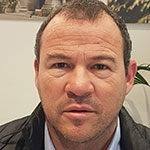 Íñigo Sanz Fernández
Profesor del área de Energía
Professor of the Energy area
Ingeniero Industrial especialidad mecánica por el Instituto Católico de Artes e Industrias (ICAI) de la Universidad Pontificia Comillas de Madrid (UPCO). Máster en Depuración de Aguas Residuales por la UCA y Máster en Prevención de Riesgos Laborales y Compilance por la Universidad Nebrija.
17 años de experiencia docente en las siguientes instituciones: Escuela de Organización Industrial (EOI), Universidad Alfonso X el Sabio (UAX), Instituto Católico de Artes e Industrias (ICAI) de la Universidad Pontificia Comillas de Madrid (UPCO), Escuela Politécnica de la Universidad Nebrija.
Experto en equipos electromecánicos relacionado con procesos de depuración de aguas residuales urbanas e industriales, director de Trabajos Fin de Grado (TFG) y Trabajos Fin de Máster (TFM) Instituto Católico de Artes e Industrias (ICAI) de la Universidad Pontificia Comillas de Madrid (UPCO) y en la Escuela Politécnica Superior de la Universidad Nebrija.
23 años de experiencia laboral en empresas punteras fabricantes de equipos electromecánicos: SULZER, FLOWSERVE, SIHI, ABS, HALDBERG y de soluciones de depuración de aguas: LOMEDA y SITRA.
Íñigo Sanz Fernández
Profesor del área de Energía
Professor of the Energy area
Ingeniero Industrial especialidad mecánica por el Instituto Católico de Artes e Industrias (ICAI) de la Universidad Pontificia Comillas de Madrid (UPCO). Máster en Depuración de Aguas Residuales por la UCA y Máster en Prevención de Riesgos Laborales y Compilance por la Universidad Nebrija.
17 años de experiencia docente en las siguientes instituciones: Escuela de Organización Industrial (EOI), Universidad Alfonso X el Sabio (UAX), Instituto Católico de Artes e Industrias (ICAI) de la Universidad Pontificia Comillas de Madrid (UPCO), Escuela Politécnica de la Universidad Nebrija.
Experto en equipos electromecánicos relacionado con procesos de depuración de aguas residuales urbanas e industriales, director de Trabajos Fin de Grado (TFG) y Trabajos Fin de Máster (TFM) Instituto Católico de Artes e Industrias (ICAI) de la Universidad Pontificia Comillas de Madrid (UPCO) y en la Escuela Politécnica Superior de la Universidad Nebrija.
23 años de experiencia laboral en empresas punteras fabricantes de equipos electromecánicos: SULZER, FLOWSERVE, SIHI, ABS, HALDBERG y de soluciones de depuración de aguas: LOMEDA y SITRA.
 Mariano Sanz Moreno
Profesor del área de Competencias Profesionales
Professor of the Professional Skills area
Ingeniero Superior de Telecomunicaciones por la Universidad Politécnica de Madrid. Experto en la aplicación de tecnologías a la formación al desarrollo de personas y organizaciones y en la implantación de modelos de competencias profesionales en múltiples empresas, incluyendo la definición, evaluación, enseñanza y mejora continua de las competencias generales y específicas de sus empleados. Entre otros cargos ha desempeñado los de Director de Desarrollo de Negocio en élogos, Director General del Internet Training Center, Director de Alcatel University Madrid y Director de Formación y Consultoría, S.A. (FYCSA- Alcatel). Además es profesor en programas de postgrado y en la actualidad es Socio Director de la consultora Atenea Conocimiento, liderando su primer proyecto de emprendizaje.
Mariano Sanz Moreno
Profesor del área de Competencias Profesionales
Professor of the Professional Skills area
Ingeniero Superior de Telecomunicaciones por la Universidad Politécnica de Madrid. Experto en la aplicación de tecnologías a la formación al desarrollo de personas y organizaciones y en la implantación de modelos de competencias profesionales en múltiples empresas, incluyendo la definición, evaluación, enseñanza y mejora continua de las competencias generales y específicas de sus empleados. Entre otros cargos ha desempeñado los de Director de Desarrollo de Negocio en élogos, Director General del Internet Training Center, Director de Alcatel University Madrid y Director de Formación y Consultoría, S.A. (FYCSA- Alcatel). Además es profesor en programas de postgrado y en la actualidad es Socio Director de la consultora Atenea Conocimiento, liderando su primer proyecto de emprendizaje.
 José Sastre Esteban
Profesor del área de Expresión Gráfica
Professor of the Graphic Expression area
Graduado en Ingeniería Mecánica y Graduado en Ingeniería del Automóvil por la Universidad Nebrija. Máster en Máquinas avanzadas y transportes por la Universidad Carlos III de Madrid. Becario de investigación en el Departamento Escuela de Ingenieros de la Escuela Politécnica Superior de la Universidad Nebrija realizando los proyectos fin de grado de “Diseño de un sistema de transporte autónomo” y “Modelización cinemática en coordenadas naturales de una motocicleta de competición”. En el año 2017 miembro de EME Technologies como asesor técnico dentro del equipo de motociclismo en el campeonato de España de Velocidad. Desde 2017 hasta la actualidad, responsable de diseño en SAF Gondolas.
José Sastre Esteban
Profesor del área de Expresión Gráfica
Professor of the Graphic Expression area
Graduado en Ingeniería Mecánica y Graduado en Ingeniería del Automóvil por la Universidad Nebrija. Máster en Máquinas avanzadas y transportes por la Universidad Carlos III de Madrid. Becario de investigación en el Departamento Escuela de Ingenieros de la Escuela Politécnica Superior de la Universidad Nebrija realizando los proyectos fin de grado de “Diseño de un sistema de transporte autónomo” y “Modelización cinemática en coordenadas naturales de una motocicleta de competición”. En el año 2017 miembro de EME Technologies como asesor técnico dentro del equipo de motociclismo en el campeonato de España de Velocidad. Desde 2017 hasta la actualidad, responsable de diseño en SAF Gondolas.
 Emilio Trigueros Páez
Profesor del área de Física
Professor of the Physics area
Doctor en Astrofísica por la Universidad de Alicante, Licenciado en Física por la Universidad de La Laguna y Master en Astrofísica por la Universidad Complutense de Madrid. Ha publicado en diferentes revistas indexadas del primer cuartil, y participado en conferencias internacionales en el área de Astrofísica Estelar. Docente en la Universidad Antonio de Nebrija.
Emilio Trigueros Páez
Profesor del área de Física
Professor of the Physics area
Doctor en Astrofísica por la Universidad de Alicante, Licenciado en Física por la Universidad de La Laguna y Master en Astrofísica por la Universidad Complutense de Madrid. Ha publicado en diferentes revistas indexadas del primer cuartil, y participado en conferencias internacionales en el área de Astrofísica Estelar. Docente en la Universidad Antonio de Nebrija.
 Alfredo Valle del Barrio
Profesor del área del Automóvil
Professor of the Automobile area
Graduado en Ingeniería de computadores por la Universidad Politécnica de Madrid. Máster en Ingeniería de redes y servicios telemáticos. Máster en Inteligencia Artificial. Realiza su doctorado en Inteligencia Artificial. Tiene más de 5 años de experiencia como investigador en el Instituto Universitario de Investigación del Automóvil Francisco Aparicio Izquierdo y ha participado en numerosos proyectos sobre vehículos conectados.
Alfredo Valle del Barrio
Profesor del área del Automóvil
Professor of the Automobile area
Graduado en Ingeniería de computadores por la Universidad Politécnica de Madrid. Máster en Ingeniería de redes y servicios telemáticos. Máster en Inteligencia Artificial. Realiza su doctorado en Inteligencia Artificial. Tiene más de 5 años de experiencia como investigador en el Instituto Universitario de Investigación del Automóvil Francisco Aparicio Izquierdo y ha participado en numerosos proyectos sobre vehículos conectados.
 Pilar Vélez Melón
Directora académica del área de Ciencias
Pilar Vélez Melón
Directora académica del área de CienciasProfesora del área de Matemáticas Academic director of the Science area
Professor of the Mathematics area Doctora y licenciada en Ciencias Matemáticas por la Universidad Complutense de Madrid, ha desarrollado su actividad docente e investigadora en las Universidades Complutense, de Pisa (Italia) y Antonio de Nebrija. En esta última ha desempeñado los cargos de Coordinadora del Área de Matemática Aplicada, Jefe de Estudios y Directora del Departamento de Ingeniería Informática, Vicerrectora y Rectora.
Profesor acreditado por ANECA en las figuras de contratado doctor y profesor de universidad privada, con un sexenio de investigación reconocido.
Participa como investigadora en un proyecto del Plan nacional de I+D+i y en una red temática de excelencia sobre Algebra computacional y aplicaciones. Sus trabajos de investigación se encuentran publicados en revistas indexadas como Journal of Symbolic Computation, Journal of Automatic Reasoning, Journal of Pure and Applied Algebra, Manuscripta Mathematica o ACM, entre otras.
Así mismo, participa activamente en congresos y reuniones en los campos del Cálculo simbólico y de la Didáctica de las matemáticas. Ha presentado recientemente sus trabajos sobre razonamiento automático en geometría o sobre pensamiento algebraico en el VIII Congreso Iberoamericano de Educación Matemática, el 24th Conference on Applications of Computer Algebra o la Conference on Digital Tools in Mathematics Education.
Forma parte de los comités científicos y organizador del I Jornadas Nebrija de Transversalidad en la Docencia. Mantiene líneas de colaboración con la Federación Española de Profesores de Matemáticas (FESPM) y la Real Sociedad Matemática Española (RSME).
 Juan Viguri Flores
Coordinador y profesor del área de Empresa
Juan Viguri Flores
Coordinador y profesor del área de EmpresaCoordinador de prácticas curriculares
Director de Trabajos Fin de Grado Coordinator and professor of the Business area
Coordinator of curricular practices
Director of Final Degree Projects Doctor Ingeniero Industrial por la Universidad Nebrija. Ingeniero Industrial por la Universidad del País Vasco, Escuela de Ingeniería de Bilbao. Director de Planificación Corporativa de Aceralia. En la Universidad Antonio Nebrija, delegado del Rector para la calidad. En la actualidad, en la Escuela Politécnica Superior, es coordinador del programa internacional, y de las prácticas curriculares y extracurriculares en empresa. Además, en el ámbito docente, tiene más de 25 años de experiencia como coordinador y profesor del área de empresa, en asignaturas tanto de Grado como de Máster. Durante varios años ha dirigido un proyecto de investigación con Arcelor para la recuperación de residuos industriales.
 Gloria Zarzuelo Puch
Profesora de las áreas de Energía y Medio Ambiente.
Professor in the areas of Energy and Environment.
Ingeniera Industrial por la UPM, especialidad Mecánica - Construcción. Máster en Prevención de Riesgos Laborales, especialidad Seguridad Industrial. Profesora de la Escuela Politécnica Superior desde el curso 2007/2008. Mención de excelencia docente en el curso 2017/2018. En la actualidad realiza los estudios de doctorado en el Programa de Doctorado en Ciencias y Tecnologías aplicadas a la Ingeniería Industrial de la UCLM. La investigación se centra en el análisis termodinámico y termoeconómico de la recuperación de energía residual en diferentes máquinas térmicas, fruto de la cual ha publicado el artículo científico “Thermodynamic and exergoeconomic analysis of energy recovery system of biogas from a wastewater treatment plant and use in a Stirling engine”, en la revista Renewable Energy. Compagina su labor docente con labores de consultoría relacionadas con el diseño y la optimización de las instalaciones de los edificios.
Gloria Zarzuelo Puch
Profesora de las áreas de Energía y Medio Ambiente.
Professor in the areas of Energy and Environment.
Ingeniera Industrial por la UPM, especialidad Mecánica - Construcción. Máster en Prevención de Riesgos Laborales, especialidad Seguridad Industrial. Profesora de la Escuela Politécnica Superior desde el curso 2007/2008. Mención de excelencia docente en el curso 2017/2018. En la actualidad realiza los estudios de doctorado en el Programa de Doctorado en Ciencias y Tecnologías aplicadas a la Ingeniería Industrial de la UCLM. La investigación se centra en el análisis termodinámico y termoeconómico de la recuperación de energía residual en diferentes máquinas térmicas, fruto de la cual ha publicado el artículo científico “Thermodynamic and exergoeconomic analysis of energy recovery system of biogas from a wastewater treatment plant and use in a Stirling engine”, en la revista Renewable Energy. Compagina su labor docente con labores de consultoría relacionadas con el diseño y la optimización de las instalaciones de los edificios.
More Academic Information
Competences
Generic horizontal skills in the bachelor's programme in Automobile EngineeringInstrumental skills
Skills having an instrumental role. Highlights include:
- Ability to analyse and synthesise.
- Ability to organise and plan.
- General knowledge.
- Fundamentals of the profession.
- Spoken and written communication in native language.
- Knowledge of a foreign language.
- IT knowledge.
- Information management ability.
- Problem-solving.
- Decision-making.
Personal skills
Individual skills consisting of the ability to express one's own feelings, and critical and self-critical skills. Social skills relating to interpersonal skills, ability to work in a team and expression of social and ethical commitments. These skills tend to support social interaction and cooperation processes. We highlight the following:
- Critical and self-critical skills.
- Teamwork.
- Interpersonal skills.
- Ability to work in an interdisciplinary team.
- Ability to communicate with experts in other areas.
- Appreciation of diversity and multiculturalism.
- Ability to work in an international context.
- Ethical commitment.
Systemic skills
The skills and abilities that relate to systems as a whole. These skills include the ability to plan changes so that improvements can be made to systems as a whole, and to design new systems. Systemic or integrating skills require the prior acquisition of instrumental and interpersonal skills. The highlights include:
- Ability to apply knowledge in practice.
- Ability to learn.
- Ability to adapt to new situations.
- Ability to generate new ideas (creativity).
- Leadership.
- Knowledge of the cultures and customs of other countries.
- Ability to work independently.
- Project design and management.
- Initiative and entrepreneurial spirit.
- Concern for quality.
- Motivation of achievement.
Basic training module
- Ability to solve mathematical issues that may arise in the course of engineering. Aptitude to apply knowledge on: linear algebra; geometry, differential geometry; differential and integral calculus; differential equations and partial derivatives; numerical methods; numerical algorithms; statistics and optimisation.
- Understanding and mastery of basic concepts on the general laws of mechanics, thermodynamics, fields and waves and electromagnetism and their application for solving engineering problems.
- Basic knowledge on the use and programming of computers, operating systems, databases and engineering software.
- Ability to understand and apply the fundamentals of general chemistry, organic and inorganic chemistry and their applications in engineering.
- Capacity for spatial vision and knowledge of graphic representation techniques, both by traditional methods of metric geometry and descriptive geometry, and by computer-aided design applications.
Module in common with the industrial engineering branch
- Knowledge of applied thermodynamics and heat transmission. Basic principles and their application to solving engineering problems.
- Understanding of the basic principles of fluid mechanics and their application to problem solving in the engineering field. Calculation of pipes, channels and fluid systems.
- Knowledge of the fundamentals of materials science, technology and chemistry. Understanding of the relationship between microstructure, synthesis or processing, and material properties.
- Knowledge and use of the principles of circuit and electrical machine theory.
- Understanding of the fundamentals of electronics.
- Understanding of the fundamentals of automation and control methods. Understanding of the principles of the theory of machines and mechanisms.
- Understanding and use of the principles of resistance of materials.
- Basic understanding of production and manufacturing systems.
- Knowledge and skills to apply the techniques of graphical engineering.
- Understanding of and ability to calculate and design industrial structures and constructions.
- Applied knowledge of manufacturing systems and processes, metrology, and quality control.
Specific to automobile engineering
- Understanding of thermal engineering applied to vehicle engines.
- Understanding of new propulsion systems applied to automobiles. Hybrid and electric vehicles and fuel cells.
- Understanding of vehicle theory.
- Understanding of vehicle systems and parts.
- Understanding of and skills to apply the fundamentals of elasticity and resistance of materials to the behaviour of automobile parts and structural elements of vehicles. Finite elements method.
- Understanding of electronic instrumentation and industrial information technology applied to electronic systems in vehicles and tests.
- Understanding of and skills to apply materials engineering to vehicle parts and structural elements.
- Awareness of the laws, regulations and standards applicable to the automobile and parts industry.
- Understanding and application of quality systems and standards to industrial projects in the automobile sector.
The Final Research Project tests that the student has acquired and integrated the general and specific skills imparted in the course of the degree programme.
The student's mastery of general skills is tested by being required to design and implement a sufficiently complex engineering project, focusing on innovation and with an emphasis on teamwork. Part of the workload may be devoted to the simulation and/or research work. When completing the project, the student must also acquire personal skills relating to searching and organising documentation, presentation, teamwork, etc.
Admission criteria
En la Universidad Antonio de Nebrija, se llevarán a cabo los procedimientos de admisión establecidos por la legislación universitaria (Real Decreto 1393/2007 de 29 de octubre por el que se establece la ordenación de las enseñanzas universitarias oficiales) con particular referencia a los principios rectores del acceso a la universidad española: igualdad, mérito, capacidad, accesibilidad universal y ajuste a los criterios del Espacio Europeo de Educación Superior.
Asimismo la Universidad Nebrija, cumple lo establecido en el Artículo 13 del Real Decreto 1892/2008. Superación de la prueba de acceso a la universidad.
“1. El acceso a la universidad española, tanto pública como privada, para cursar las enseñanzas conducentes a la obtención de los distintos títulos de las enseñanzas universitarias oficiales de Grado con validez en todo el territorio nacional, requerirá, con carácter general, la superación de la prueba a la que se refiere el artículo 38 de la Ley Orgánica 2/2006, de 3 de mayo, de Educación, que se regula en el presente real decreto, sin perjuicio de los otros supuestos previstos en el artículo 3 del presente real decreto.”
El perfil de ingreso recomendado es el del alumno de bachillerato tecnológico, con buenas calificaciones, con especial inclinación hacia la mecánica y los automóviles, y buena base en materias fundamentales como física y matemática.
En el caso de acceso desde ciclos formativos superiores de formación profesional, el ciclo formativo superior recomendado para acceder al grado será el de mantenimiento de vehículos autopropulsados (en sus tres títulos).
Pueden solicitar la admisión en primer curso los estudiantes que se encuentren en alguna de las siguientes situaciones académicas:
- Alumnos procedentes de 2º de Bachillerato y Selectividad o COU y Selectividad.
- Alumnos que hubieran finalizado sus estudios de enseñanza secundaria en el extranjero y tengan acceso a la Universidad de su país (para los países miembros de la Unión Europea o firmantes del acuerdo sobre el Espacio Económico Europeo o aquellos con los que se haya suscrito acuerdo de reconocimiento de títulos).
- Alumnos que hubieran finalizado sus estudios de enseñanza secundaria en el extranjero y hayan superado la Selectividad para Extranjeros (resto de los sistemas educativos).
- Pueden solicitar la admisión en cursos distintos de primero los estudiantes que hayan realizado estudios universitarios en otra universidad española o extranjera y quieran continuarlos en la Universidad Nebrija, o bien quieran comenzar otros distintos de esta Universidad.
Forma y plazos de presentación de solicitudes de admisión
Para solicitar la admisión en cualquier estudio universitario oficial de Grado de la Universidad será necesario cumplimentar la correspondiente solicitud de admisión a través de la página web de la Universidad, o bien solicitarla en cualquiera de los campus universitarios dentro de los plazos establecidos por el Departamento de Desarrollo Universitario. Más información.
Proceso de admisión
El proceso de admisión, en los programas de grado, se divide en varias fases, tal y como se detalla a continuación:
- 1. Preinscripción
Los estudiantes que desean iniciar sus estudios universitarios en la Universidad Antonio de Nebrija deben presentar el impreso de solicitud de admisión junto con la documentación requerida.
La presentación de la solicitud de admisión junto con el impreso de elección de fecha para la realización de la prueba de admisión se realiza personalmente durante una visita a la Universidad o se remite por correo postal a la Universidad.
Igualmente se puede iniciar el procedimiento de admisión rellenando el formulario de admisión on-line. La Sección de Información Académica confirma al candidato la recepción de la solicitud impresa u on-line y le convoca a la prueba de admisión elegida.
El día de la prueba de admisión, el candidato debe presentar, si no lo ha hecho con antelación, la siguiente documentación:- Fotocopia del expediente académico.
- Fotocopia del DNI o pasaporte.
- Dos fotografías tamaño carné.
- Carta de presentación de un profesor/tutor del centro de procedencia o persona con quien haya tenido contacto académico o profesional
- 2. Pruebas de admisión
Todos los alumnos que desean realizar su carrera universitaria en la Universidad Antonio de Nebrija deben superar un proceso de admisión consistente en:- Evaluación del expediente académico.
- Evaluación de los resultados obtenidos en las pruebas de admisión
- Estas pruebas que se desarrollan en una jornada - mañana o tarde - tienen una duración aproximada de 3 horas y consisten en:
- Prueba psicotécnica.
- Prueba específica de la/s titulación/es elegida/a.
- Prueba de nivel de inglés.
- Entrevista personal con un profesor de la universidad.
Los resultados de las pruebas de admisión se comunican por escrito y por teléfono a cada candidato en un plazo aproximado de 3 a 5 días.
- 3. Prematrícula
Una vez comunicada la admisión, los candidatos deben realizar la reserva de plaza. Esta prematrícula económica garantiza la plaza del candidato en la Universidad. - 4. Matrícula
Los candidatos prematriculados que deseen formalizar su matrícula académica en la Universidad deberán, dentro de los plazos señalados, seguir los siguientes pasos:- Entrega de documentación: acreditar documentalmente que han superado los requisitos establecidos por la legislación universitaria española para poder comenzar/continuar sus estudios universitarios en la Universidad Nebrija.
- Formalización del proceso de matrícula vía Internet: El servicio de automatrícula de la página Web de la Nebrija permite a los estudiantes admitidos realizar todos los trámites académicos, económicos y administrativos, sin tener que desplazarse físicamente a la Universidad. Los alumnos admitidos formalizarán su automatrícula en los plazos que se indiquen. Para ello, recibirán en su domicilio, junto con su carta de admisión, la clave de acceso y contraseña personal necesarios para poder realizar su automatrícula académica y económica. Formalizada la automatrícula, el candidato adquiere la condición de alumno de la Universidad Nebrija. En el proceso de automatrícula, el alumno cuenta en todo momento con asistencia técnica de los Servicios Informáticos, así como con asistencia académica, a través del que será su tutor, para que éste le pueda orientar en la elección de asignaturas.
- Abono de los derechos de inscripción anual de la titulación para la que resultó admitido. La tasa de reserva de plaza es una parte de los derechos de inscripción anual.
Employability
Employability recognized in the Rankings
The commitment of Nebrija University to the academic requirement, training in leading companies and institutions, innovation in multidisciplinary programs and international projection, places the University in the top positions of the most important rankings.
The International Ranking QS Stars awards Nebrija University the maximum score in the quality and satisfaction of students in teaching, employability of the graduates and the internationalization of the institution.
The national rankings also recognize Nebrija University as the first Spanish university in teaching and second in employability, highlighting its performance in research, knowledge transfer and internationalization.
The Bologna Declaration formalized the principles on which the European Higher Education Area should be based: quality, mobility, diversity, competitiveness and employment growth.
From this, Nebrija stands as an academic model of reference, educating students with excellent individual behavior, interaction with their environment and motivated by and for constant and continuous training. The Nebrija Institute of Professional Skills works every day to achieve the differentiation of our students through the development of attitudes and skills.
The main objective is for students to achieve the best of themselves through the development and empowerment of their personal skills and resources through personal self-knowledge.
In addition, some of the professional skills that are worked on within the three seminars are those related to interpersonal skills and active communication skills and negotiation, indispensable for our students to know how to transmit ideas, to argue them, to provide information and opinions in an adequate, clear and convincing way.
Within what will be their work performance, other aspects such as teamwork, conflict resolution and project management ability will be worked on.
In the third block, skills worked on are those aimed at increasing the student's employability. They will work with tools and techniques for job searching, and perform tasks that achieve in the student a greater use of their personal skills.
For all this we have currently active experts in selection of people, professionals dedicated to personal and professional training and professionals dedicated to the world of communication and the arts.
In this way, and in a complementary way to his/her specific training, we help the student create a differentiating pattern in the social and business environment in which he/she will be immersed when he/she finishes his/her studies.
International
The Department of International Programs of Nebrija University carries out a constant effort to follow up on the agreements with the most prestigious universities.
Students can study at one of the following foreign universities
NOTE: The destination universities, offered by degree, may vary according to the International Mobility Program. For more information, students can consult the information online in the International Mobility Program.
Several universities have special academic or linguistic requirements. For more information, consult the Department of International Programs.
The information published here is for guidance only and may be subject to modification.
Testimonials
University Life in Automobile Engineering
Visit all the Activities of the Higher Polytechnic School
Descubre el Degree in Automobile Engineering
Una formación especializada donde podrás aprender al lado de los mejores y participando en proyectos reales como el Nebrija To Dakar o Moto Student.
Mónica Plaza presenta en la Universidad Nebrija el coche que pilotará junto a su padre en el Dakar
Sodicars, fabricante de vehículos y estructura deportiva con más de 11 años de experiencia en la competición y en el mundo del Motorsport, y la Universidad Nebrija han formado una alianza que ha permitido a los estudiantes ingenieros de la Universidad rediseñar y mejorar el vehículo que participará en los casi 5000 kilómetros cronometrados del Dakar 2023. [Más información]
The Iberian Supercars Endurance champion car made an impressive appearance at Nebrija.
On December 1, attendees at the Madrid-Princesa Campus were captivated as they strolled through the courtyard, encountering a remarkable sight that prompted amazement and photo-taking. The focal point was a gleaming racing car that stood out conspicuously. This was not just any racing car; it was the BMW M240i Racing from the Autoworks MotorSport team, which secured the championship title in the Iberian Supercars Endurance in 2023.
Siente la pasión del motor con el Club del Automóvil Nebrija
Los alumnos unen a su aprendizaje teórico más tradicional, la participación activa en proyectos profesionales reales, donde pueden poner en práctica lo aprendido.
Road to Dakar
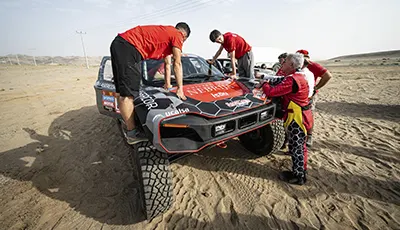
Nebrija University is part of the Dakar Rally, the most demanding motor race in the world. A long-term project started in 2022, with a clear roadmap in which our students, teachers and researchers, together with the Sodicars competition team, will integrate the new technological advances into this type of vehicle.
Nebrija-Sodicars, a leading team in terms of technology, innovation, research and sustainability in the Dakar Rally.
MotoStudent
El reto universitario definitivo sobre dos ruedas. Una oportunidad única para los amantes del motociclismo de involucrarse de lleno en la competición por excelencia dentro del marco universitario. Trabajando en equipo, los alumnos conocerán en detalle este tipo de vehículo y responderán al desafío de ingeniería que supone encontrar la solución perfecta para obtener el máximo rendimiento de la moto en la pista. Una experiencia inolvidable para los alumnos y que les permite conocer y aprender en un entorno profesional.
Nebrija Virtual Engineering
El mundo de la competición automovilística ha experimentado un crecimiento en los últimos años gracias al desarrollo que han tenido los entornos de simulación virtual o SimRacing. Una vertiente más asequible que no requiere de desorbitados alquileres de circuitos y vehículos. La Universidad Nebrija desde 2018 ha apostado por este sector con la creación de Nebrija Virtual Engineering, equipo de competición formado por alumnos y miembros del Club del Automóvil. El equipo, haciendo uso de sofisticado simulador artesanal (Cool Perfomance Formula Simulator), se enfrenta y solventa retos y desafíos propios de la competición real. Estrategias de carrera, configuración de setups, análisis de telemetrías… un sinfín de situaciones que permiten a los alumnos aprender y conseguir experiencia real de un entorno de competición.
Otras actividades y eventos del Club del Automóvil Nebrija
- Competiciones de Karting
- Competiciones de SimRacing
- Ponencias y Clases Magistrales (Lucas Ordóñez, José Manuel López, Roberto Gómez…)
- Visitas a Exposiciones, Fábricas y Museos (Retromóvil, Barreiros, RacingAuto…)
- Asistencia a Competiciones Reales (Circuito del Jarama, Rallies…)
- Cursos y Talleres (Ofimática, Python, Matlab-Simulink, Bicicleta Eléctrica, Motores, Soldadura…)
- Conferencias Web (Comisarios de Competición…)
- Becas de Colaboración

